- Home
- Jack London
Smoke Bellew Page 11
Smoke Bellew Read online
Page 11
XI. THE TOWN-SITE OF TRA-LEE
Smoke and Shorty encountered each other, going in opposite directions,at the corner where stood the Elkhorn saloon. The former's face worea pleased expression, and he was walking briskly. Shorty, on the otherhand, was slouching along in a depressed and indeterminate fashion.
"Whither away?" Smoke challenged gaily.
"Danged if I know," came the disconsolate answer. "Wisht I did. Theyain't nothin' to take me anywheres. I've set two hours in the deadestgame of draw--nothing excitin', no hands, an' broke even. Played arubber of cribbage with Skiff Mitchell for the drinks, an' now I'm thatlanguid for somethin' doin' that I'm perambulatin' the streets on thechance of seein' a dogfight, or a argument, or somethin'."
"I've got something better on hand," Smoke answered. "That's why I waslooking for you. Come on along."
"Now?"
"Sure."
"Where to?"
"Across the river to make a call on old Dwight Sanderson."
"Never heard of him," Shorty said dejectedly. "An' never heard of no oneliving across the river anyway. What's he want to live there for? Ain'the got no sense?"
"He's got something to sell," Smoke laughed.
"Dogs? A gold-mine? Tobacco? Rubber boots?"
Smoke shook his head to each question. "Come along on and find out,because I'm going to buy it from him on a spec, and if you want you cancome in half."
"Don't tell me it's eggs!" Shorty cried, his face twisted into anexpression of facetious and sarcastic alarm.
"Come on along," Smoke told him. "And I'll give you ten guesses whilewe're crossing the ice."
They dipped down the high bank at the foot of the street and came outupon the ice-covered Yukon. Three-quarters of a mile away, directlyopposite, the other bank of the stream uprose in precipitous bluffshundreds of feet in height. Toward these bluffs, winding and twisting inand out among broken and upthrown blocks of ice, ran a slightly traveledtrail. Shorty trudged at Smoke's heels, beguiling the time with guessesat what Dwight Sanderson had to sell.
"Reindeer? Copper-mine or brick-yard? That's one guess. Bear-skins, orany kind of skins? Lottery tickets? A potato-ranch?"
"Getting near it," Smoke encouraged. "And better than that."
"Two potato-ranches? A cheese-factory? A moss-farm?"
"That's not so bad, Shorty. It's not a thousand miles away."
"A quarry?"
"That's as near as the moss-farm and the potato-ranch."
"Hold on. Let me think. I got one guess comin'." Ten silent minutespassed. "Say, Smoke, I ain't goin' to use that last guess. When thisthing you're buyin' sounds like a potato-ranch, a moss-farm, and astone-quarry, I quit. An' I don't go in on the deal till I see it an'size it up. What is it?"
"Well, you'll see the cards on the table soon enough. Kindly cast youreyes up there. Do you see the smoke from that cabin? That's where DwightSanderson lives. He's holding down a town-site location."
"What else is he holdin' down?"
"That's all," Smoke laughed. "Except rheumatism. I hear he's beensuffering from it."
"Say!" Shorty's hand flashed out and with an abrupt shoulder gripbrought his comrade to a halt. "You ain't telling me you're buyin' atown-site at this fallin'-off place?"
"That's your tenth guess, and you win. Come on."
"But wait a moment," Shorty pleaded. "Look at it--nothin' but bluffs an'slides, all up-and-down. Where could the town stand?"
"Search me."
"Then you ain't buyin' it for a town?"
"But Dwight Sanderson's selling it for a town," Smoke baffled. "Come on.We've got to climb this slide."
The slide was steep, and a narrow trail zigzagged up it on a formidableJacob's ladder. Shorty moaned and groaned over the sharp corners and thesteep pitches.
"Think of a town-site here. They ain't a flat space big enough for apostage-stamp. An' it's the wrong side of the river. All the freightin'goes the other way. Look at Dawson there. Room to spread for fortythousand more people. Say, Smoke. You're a meat-eater. I know that. An'I know you ain't buyin' it for a town. Then what in Heaven's name areyou buyin' it for?"
"To sell, of course."
"But other folks ain't as crazy as old man Sanderson an' you."
"Maybe not in the same way, Shorty. Now I'm going to take thistown-site, break it up in parcels, and sell it to a lot of sane peoplewho live over in Dawson."
"Huh! All Dawson's still laughing at you an' me an' them eggs. You wantto make 'em laugh some more, hey?"
"I certainly do."
"But it's too danged expensive, Smoke. I helped you make 'em laughon the eggs, an' my share of the laugh cost me nearly nine thousan'dollars."
"All right. You don't have to come in on this. The profits will be allmine, but you've got to help me just the same."
"Oh, I'll help all right. An' they can laugh at me some more. But nary aounce do I drop this time.
"What's old Sanderson holdin' it at? A couple of hundred?"
"Ten thousand. I ought to get it for five."
"Wisht I was a minister," Shorty breathed fervently.
"What for?"
"So I could preach the gosh-dangdest, eloquentest sermon on a text youmay have hearn--to wit: a fool an' his money."
"Come in," they heard Dwight Sanderson yell irritably, when they knockedat his door, and they entered to find him squatted by a stone fireplaceand pounding coffee wrapped in a piece of flour-sacking.
"What d'ye want?" he demanded harshly, emptying the pounded coffee intothe coffee-pot that stood on the coals near the front of the fireplace.
"To talk business," Smoke answered. "You've a town-site located here, Iunderstand. What do you want for it?"
"Ten thousand dollars," came the answer. "And now that I've told you,you can laugh, and get out. There's the door. Good-by."
"But I don't want to laugh. I know plenty of funnier things to do thanto climb up this cliff of yours. I want to buy your town-site."
"You do, eh? Well, I'm glad to hear sense." Sanderson came over and satdown facing his visitors, his hands resting on the table and his eyescocking apprehensively toward the coffee-pot. "I've told you my price,and I ain't ashamed to tell you again--ten thousand. And you can laughor buy, it's all one to me."
To show his indifference he drummed with his knobby knuckles on thetable and stared at the coffee-pot. A minute later he began to hum amonotonous "Tra-la-loo, tra-la-lee, tra-la-lee, tra-la-loo."
"Now look here, Mr. Sanderson," said Smoke. "This town-site isn't worthten thousand. If it was worth that much it would be worth a hundredthousand just as easily. If it isn't worth a hundred thousand--and youknow it isn't--then it isn't worth ten cents."
Sanderson drummed with his knuckles and hummed, "Tra-la-loo,tra-la-lee," until the coffee-pot boiled over. Settling it with a partcup of cold water, and placing it to one side of the warm hearth, heresumed his seat. "How much will you offer?" he asked of Smoke.
"Five thousand."
Shorty groaned.
Again came an interval of drumming and of tra-loo-ing and tra-lee-ing.
"You ain't no fool," Sanderson announced to Smoke. "You said if itwasn't worth a hundred thousand it wasn't worth ten cents. Yet you offerfive thousand for it. Then it IS worth a hundred thousand."
"You can't make twenty cents out of it," Smoke replied heatedly. "Not ifyou stayed here till you rot."
"I'll make it out of you."
"No, you won't."
"Then I reckon I'll stay an' rot," Sanderson answered with an air offinality.
He took no further notice of his guests, and went about his culinarytasks as if he were alone. When he had warmed over a pot of beans and aslab of sour-dough bread, he set the table for one and proceeded to eat.
"No, thank you," Shorty murmured. "We ain't a bit hungry. We et justbefore we come."
"Let's see your papers," Smoke said at last. Sanderson fumbled under thehead of his bunk and tossed out a package of documents. "It's all tightand right,"
he said. "That long one there, with the big seals, comeall the way from Ottawa. Nothing territorial about that. The nationalCanadian government cinches me in the possession of this town-site."
"How many lots you sold in the two years you've had it?" Shorty queried.
"None of your business," Sanderson answered sourly. "There ain't no lawagainst a man living alone on his town-site if he wants to."
"I'll give you five thousand," Smoke said. Sanderson shook his head.
"I don't know which is the craziest," Shorty lamented. "Come outside aminute, Smoke. I want to whisper to you."
Reluctantly Smoke yielded to his partner's persuasions.
"Ain't it never entered your head," Shorty said, as they stood in thesnow outside the door, "that they's miles an' miles of cliffs on bothsides of this fool town-site that don't belong to nobody an' that youcan have for the locatin' and stakin'?"
"They won't do," Smoke answered.
"Why won't they?"
"It makes you wonder, with all those miles and miles, why I'm buyingthis particular spot, doesn't it?"
"It sure does," Shorty agreed.
"And that's the very point," Smoke went on triumphantly. "If it makesyou wonder, it will make others wonder. And when they wonder they'llcome a-running. By your own wondering you prove it's sound psychology.Now, Shorty, listen to me; I'm going to hand Dawson a package that willknock the spots out of the egg-laugh. Come on inside."
"Hello," said Sanderson, as they re-entered. "I thought I'd seen thelast of you."
"Now what is your lowest figure?" Smoke asked.
"Twenty thousand."
"I'll give you ten thousand."
"All right, I'll sell at that figure. It's all I wanted in the firstplace. But when will you pay the dust over?"
"To-morrow, at the Northwest Bank. But there are two other things I wantfor that ten thousand. In the first place, when you receive your moneyyou pull down the river to Forty Mile and stay there the rest of thewinter."
"That's easy. What else?"
"I'm going to pay you twenty-five thousand, and you rebate me fifteen ofit."
"I'm agreeable." Sanderson turned to Shorty. "Folks said I was a foolwhen I come over here an' town-sited," he jeered. "Well, I'm a tenthousand dollar fool, ain't I?"
"The Klondike's sure full of fools," was all Shorty could retort, "an'when they's so many of 'em some has to be lucky, don't they?"
Next morning the legal transfer of Dwight Sanderson's town-site wasmade--"henceforth to be known as the town-site of Tra-Lee," Smokeincorporated in the deed. Also, at the Northwest Bank, twenty-fivethousand of Smoke's gold was weighed out by the cashier, while halfa dozen casual onlookers noted the weighing, the amount, and therecipient.
In a mining-camp all men are suspicious. Any untoward act of any man islikely to be the cue to a secret gold strike, whether the untowardact be no more than a hunting trip for moose or a stroll after dark toobserve the aurora borealis. And when it became known that so prominenta figure as Smoke Bellew had paid twenty-five thousand dollars to oldDwight Sanderson, Dawson wanted to know what he had paid it for. Whathad Dwight Sanderson, starving on his abandoned town-site, ever ownedthat was worth twenty-five thousand? In lieu of an answer, Dawson wasjustified in keeping Smoke in feverish contemplation.
By mid-afternoon it was common knowledge that several score of men hadmade up light stampeding-packs and cached them in the convenient saloonsalong Main Street. Wherever Smoke moved, he was the observed of manyeyes. And as proof that he was taken seriously, not one man of the manyof his acquaintance had the effrontery to ask him about his deal withDwight Sanderson. On the other hand, no one mentioned eggs to Smoke.Shorty was under similar surveillance and delicacy of friendliness.
"Makes me feel like I'd killed somebody, or had smallpox, the way theywatch me an' seem afraid to speak," Shorty confessed, when he chanced tomeet Smoke in front of the Elkhorn. "Look at Bill Saltman there acrostthe way--just dyin' to look, an' keepin' his eyes down the street allthe time. Wouldn't think he'd knowed you an' me existed, to look at him.But I bet you the drinks, Smoke, if you an' me flop around the cornerquick, like we was goin' somewheres, an' then turn back from around thenext corner, that we run into him a-hikin' hell-bent."
They tried the trick, and, doubling back around the second corner,encountered Saltman swinging a long trail-stride in pursuit.
"Hello, Bill," Smoke greeted. "Which way?"
"Hello. Just a-strollin'," Saltman answered, "just a-strollin'.Weather's fine, ain't it?"
"Huh!" Shorty jeered. "If you call that strollin', what might you walkreal fast at?"
When Shorty fed the dogs that evening, he was keenly conscious that fromthe encircling darkness a dozen pairs of eyes were boring in upon him.And when he stick-tied the dogs, instead of letting them forage freethrough the night, he knew that he had administered another jolt to thenervousness of Dawson.
According to program, Smoke ate supper downtown and then proceeded toenjoy himself. Wherever he appeared, he was the center of interest, andhe purposely made the rounds. Saloons filled up after his entrance andemptied following upon his departure. If he bought a stack of chips ata sleepy roulette-table, inside five minutes a dozen players were aroundhim. He avenged himself, in a small way, on Lucille Arral, by gettingup and sauntering out of the Opera House just as she came on to singher most popular song. In three minutes two-thirds of her audience hadvanished after him.
At one in the morning he walked along an unusually populous Main Streetand took the turning that led up the hill to his cabin. And when hepaused on the ascent, he could hear behind him the crunch of moccasinsin the snow.
For an hour the cabin was in darkness, then he lighted a candle, and,after a delay sufficient for a man to dress in, he and Shorty opened thedoor and began harnessing the dogs. As the light from the cabin flaredout upon them and their work, a soft whistle went up from not far away.This whistle was repeated down the hill.
"Listen to it," Smoke chuckled. "They've relayed on us and are passingthe word down to town. I'll bet you there are forty men right nowrolling out of their blankets and climbing into their pants."
"Ain't folks fools," Shorty giggled back. "Say, Smoke, they ain'tnothin' in hard graft. A geezer that'd work his hands these days isa--well, a geezer. The world's sure bustin' full an' dribblin' over theedges with fools a-honin' to be separated from their dust. An' before westart down the hill I want to announce, if you're still agreeable, thatI come in half on this deal."
The sled was lightly loaded with a sleeping- and a grub-outfit. Asmall coil of steel cable protruded inconspicuously from underneath agrub-sack, while a crowbar lay half hidden along the bottom of the slednext to the lashings.
Shorty fondled the cable with a swift-passing mitten, and gave a lastaffectionate touch to the crowbar. "Huh!" he whispered. "I'd sure dosome tall thinking myself if I seen them objects on a sled on a darknight."
They drove the dogs down the hill with cautious silence, and when,emerged on the flat, they turned the team north along Main Street towardthe sawmill and directly away from the business part of town, theyobserved even greater caution. They had seen no one, yet when thischange of direction was initiated, out of the dim starlit darknessbehind arose a whistle. Past the sawmill and the hospital, at livelyspeed, they went for a quarter of a mile. Then they turned about andheaded back over the ground they had just covered. At the end of thefirst hundred yards they barely missed colliding with five men racingalong at a quick dog-trot. All were slightly stooped to the weight ofstampeding-packs. One of them stopped Smoke's lead-dog, and the restclustered around.
"Seen a sled goin' the other way?" was asked.
"Nope," Smoke answered. "Is that you, Bill?"
"Well, I'll be danged!" Bill Saltman ejaculated in honest surprise. "Ifit ain't Smoke!"
"What are you doing out this time of night?" Smoke inquired."Strolling?"
Before Bill Saltman could make reply, two running men joined the group.These were follow
ed by several more, while the crunch of feet on thesnow heralded the imminent arrival of many others.
"Who are your friends?" Smoke asked. "Where's the stampede?"
Saltman, lighting his pipe, which was impossible for him to enjoy withlungs panting from the run, did not reply. The ruse of the match was tooobviously for the purpose of seeing the sled to be misunderstood,and Smoke noted every pair of eyes focus on the coil of cable and thecrowbar. Then the match went out.
"Just heard a rumor, that's all, just a rumor," Saltman mumbled withponderous secretiveness.
"You might let Shorty and me in on it," Smoke urged.
Somebody snickered sarcastically in the background.
"Where are YOU bound?" Saltman demanded.
"And who are you?" Smoke countered. "Committee of safety?"
"Just interested, just interested," Saltman said.
"You bet your sweet life we're interested," another voice spoke up outof the darkness.
"Say," Shorty put in, "I wonder who's feelin' the foolishest?"
Everybody laughed nervously.
"Come on, Shorty; we'll be getting along," Smoke said, mushing the dogs.
The crowd formed in behind and followed.
"Say, ain't you-all made a mistake?" Shorty gibed. "When we met you youwas goin', an' now you're comin' without bein' anywheres. Have you lostyour tag?"
"You go to the devil," was Saltman's courtesy. "We go and come just aswe danged feel like. We don't travel with tags."
And the sled, with Smoke in the lead and Shorty at the pole, went ondown Main Street escorted by three score men, each of whom, on hisback, bore a stampeding-pack. It was three in the morning, and only theall-night rounders saw the procession and were able to tell Dawson aboutit next day.
Half an hour later, the hill was climbed and the dogs unharnessed at thecabin door, the sixty stampeders grimly attendant.
"Good-night, fellows," Smoke called, as he closed the door.
In five minutes the candle was put out, but before half an hour hadpassed Smoke and Shorty emerged softly, and without lights beganharnessing the dogs.
"Hello, Smoke!" Saltman said, stepping near enough for them to see theloom of his form.
"Can't shake you, Bill, I see," Smoke replied cheerfully. "Where're yourfriends?"
"Gone to have a drink. They left me to keep an eye on you, and keep it Iwill. What's in the wind anyway, Smoke? You can't shake us, so you mightas well let us in. We're all your friends. You know that."
"There are times when you can let your friends in," Smoke evaded, "andtimes when you can't. And, Bill, this is one of the times when we can't.You'd better go to bed. Good-night."
"Ain't goin' to be no good-night, Smoke. You don't know us. We'rewoodticks."
Smoke sighed. "Well, Bill, if you WILL have your will, I guess you'llhave to have it. Come on, Shorty, we can't fool around any longer."
Saltman emitted a shrill whistle as the sled started, and swung inbehind. From down the hill and across the flat came the answeringwhistles of the relays. Shorty was at the gee-pole, and Smoke andSaltman walked side by side.
"Look here, Bill," Smoke said. "I'll make you a proposition. Do you wantto come in alone on this?"
Saltman did not hesitate. "An' throw the gang down? No, sir. We'll allcome in."
"You first, then," Smoke exclaimed, lurching into a clinch and tippingthe other into deep snow beside the trail.
Shorty hawed the dogs and swung the team to the south on the trail thatled among the scattered cabins on the rolling slopes to the rear ofDawson. Smoke and Saltman, locked together, rolled in the snow. Smokeconsidered himself in gilt-edged condition, but Saltman outweighed himby fifty pounds of clean, trail-hardened muscle and repeatedly masteredhim. Time and time again he got Smoke on his back, and Smoke laycomplacently and rested. But each time Saltman attempted to get off himand get away, Smoke reached out a detaining, tripping hand that broughtabout a new clinch and wrestle.
"You can go some," Saltman acknowledged, panting at the end of tenminutes, as he sat astride Smoke's chest. "But I down you every time."
"And I hold you every time," Smoke panted back. "That's what I'm herefor, just to hold you. Where do you think Shorty's getting to all thistime?"
Saltman made a wild effort to go clear, and all but succeeded. Smokegripped his ankle and threw him in a headlong tumble. From down the hillcame anxious questioning whistles. Saltman sat up and whistled a shrillanswer, and was grappled by Smoke, who rolled him face upward and satastride his chest, his knees resting on Saltman's biceps, his handson Saltman's shoulders and holding him down. And in this position thestampeders found them. Smoke laughed and got up.
"Well, good-night, fellows," he said, and started down the hill, withsixty exasperated and grimly determined stampeders at his heels.
He turned north past the sawmill and the hospital and took the rivertrail along the precipitous bluffs at the base of Moosehide Mountain.Circling the Indian village, he held on to the mouth of Moose Creek,then turned and faced his pursuers.
"You make me tired," he said, with a good imitation of a snarl.
"Hope we ain't a-forcin' you," Saltman murmured politely.
"Oh, no, not at all," Smoke snarled with an even better imitation, ashe passed among them on the back-trail to Dawson. Twice he attempted tocross the trailless icejams of the river, still resolutely followed, andboth times he gave up and returned to the Dawson shore. Straight downMain Street he trudged, crossing the ice of Klondike River to KlondikeCity and again retracing to Dawson. At eight o'clock, as gray dawn beganto show, he led his weary gang to Slavovitch's restaurant, where tableswere at a premium for breakfast.
"Good-night fellows," he said, as he paid his reckoning.
And again he said good-night, as he took the climb of the hill. In theclear light of day they did not follow him, contenting themselves withwatching him up the hill to his cabin.
For two days Smoke lingered about town, continually under vigilantespionage. Shorty, with the sled and dogs, had disappeared. Neithertravelers up and down the Yukon, nor from Bonanza, Eldorado, nor theKlondike, had seen him. Remained only Smoke, who, soon or late, wascertain to try to connect with his missing partner; and upon Smokeeverybody's attention was centered. On the second night he did not leavehis cabin, putting out the lamp at nine in the evening and setting thealarm for two next morning. The watch outside heard the alarm go off,so that when, half an hour later, he emerged from the cabin, he foundwaiting for him a band, not of sixty men, but of at least three hundred.A flaming aurora borealis lighted the scene, and, thus hugelyescorted, he walked down to town and entered the Elkhorn. The place wasimmediately packed and jammed by an anxious and irritated multitude thatbought drinks, and for four weary hours watched Smoke play cribbagewith his old friend Breck. Shortly after six in the morning, with anexpression on his face of commingled hatred and gloom, seeing no one,recognizing no one, Smoke left the Elkhorn and went up Main Street,behind him the three hundred, formed in disorderly ranks, chanting:"Hay-foot! Straw-foot! Hep! Hep! Hep!"
"Good-night, fellows," he said bitterly, at the edge of the Yukon bankwhere the winter trail dipped down. "I'm going to get breakfast and thengo to bed."
The three hundred shouted that they were with him, and followed him outupon the frozen river on the direct path he took for Tra-Lee. At sevenin the morning he led his stampeding cohort up the zigzag trail, acrossthe face of the slide, that led to Dwight Sanderson's cabin. The lightof a candle showed through the parchment-paper window, and smoke curledfrom the chimney. Shorty threw open the door.
"Come on in, Smoke," he greeted. "Breakfast's ready. Who-all are yourfriends?"
Smoke turned about on the threshold. "Well, good-night, you fellows.Hope you enjoyed your pasear!"
"Hold on a moment, Smoke," Bill Saltman cried, his voice keen withdisappointment. "Want to talk with you a moment."
"Fire away," Smoke answered genially.
"What'd you pay old Sanderson twenty-five thousa
n' for? Will you answerthat?"
"Bill, you give me a pain," was Smoke's reply. "I came over here fora country residence, so to say, and here are you and a gang trying tocross-examine me when I'm looking for peace an' quietness an' breakfast.What's a country residence good for, except for peace and quietness?"
"You ain't answered the question," Bill Saltman came back with rigidlogic.
"And I'm not going to, Bill. That affair is peculiarly a personal affairbetween Dwight Sanderson and me. Any other question?"
"How about that crowbar an' steel cable then, what you had on your sledthe other night?"
"It's none of your blessed and ruddy business, Bill. Though if Shortyhere wants to tell you about it, he can."
"Sure!" Shorty cried, springing eagerly into the breach. Hismouth opened, then he faltered and turned to his partner. "Smoke,confidentially, just between you an' me, I don't think it IS any oftheir darn business. Come on in. The life's gettin' boiled outa thatcoffee."
The door closed and the three hundred sagged into forlorn and grumblinggroups.
"Say, Saltman," one man said, "I thought you was goin' to lead us toit."
"Not on your life," Saltman answered crustily. "I said Smoke would leadus to it."
"An' this is it?"
"You know as much about it as me, an' we all know Smoke's got somethingsalted down somewheres. Or else for what did he pay Sanderson thetwenty-five thousand? Not for this mangy town-site, that's sure an'certain."
A chorus of cries affirmed Saltman's judgment.
"Well, what are we goin' to do now?" someone queried dolefully.
"Me for one for breakfast," Wild Water Charley said cheerfully. "You ledus up a blind alley this time, Bill."
"I tell you I didn't," Saltman objected. "Smoke led us. An' just thesame, what about them twenty-five thousand?"
At half-past eight, when daylight had grown strong, Shorty carefullyopened the door and peered out. "Shucks," he exclaimed. "They-all'shiked back to Dawson. I thought they was goin' to camp here."
"Don't worry; they'll come sneaking back," Smoke reassured him. "If Idon't miss my guess you'll see half Dawson over here before we're donewith it. Now jump in and lend me a hand. We've got work to do."
"Aw, for Heaven's sake put me on," Shorty complained, when, at the endof an hour, he surveyed the result of their toil--a windlass in thecorner of the cabin, with an endless rope that ran around doublelogrollers.
Smoke turned it with a minimum of effort, and the rope slipped andcreaked. "Now, Shorty, you go outside and tell me what it sounds like."
Shorty, listening at the closed door, heard all the sounds of a windlasshoisting a load, and caught himself unconsciously attempting to estimatethe depth of shaft out of which this load was being hoisted. Next camea pause, and in his mind's eye he saw the bucket swinging short to thewindlass. Then he heard the quick lower-away and the dull sound as ofthe bucket coming to abrupt rest on the edge of the shaft. He threw openthe door, beaming.
"I got you," he cried. "I almost fell for it myself. What next?"
The next was the dragging into the cabin of a dozen sled-loads of rock.And through an exceedingly busy day there were many other nexts.
"Now you run the dogs over to Dawson this evening," Smoke instructed,when supper was finished. "Leave them with Breck. He'll take care ofthem. They'll be watching what you do, so get Breck to go to the A. C.Company and buy up all the blasting-powder--there's only several hundredpounds in stock. And have Breck order half a dozen hard-rock drills fromthe blacksmith. Breck's a quartz-man, and he'll give the blacksmitha rough idea of what he wants made. And give Breck these locationdescriptions, so that he can record them at the gold commissioner'sto-morrow. And finally, at ten o'clock, you be on Main Street listening.Mind you, I don't want them to be too loud. Dawson must just hear themand no more than hear them. I'll let off three, of different quantities,and you note which is more nearly the right thing."
At ten that night Shorty, strolling down Main Street, aware of manycurious eyes, his ears keyed tensely, heard a faint and distantexplosion. Thirty seconds later there was a second, sufficiently loudto attract the attention of others on the street. Then came a third, soviolent that it rattled the windows and brought the inhabitants into thestreet.
"Shook 'em up beautiful," Shorty proclaimed breathlessly, an hourafterward, when he arrived at the cabin on Tra-Lee. He gripped Smoke'shand. "You should a-saw 'em. Ever kick over a ant-hole? Dawson'sjust like that. Main Street was crawlin' an' hummin' when I pulled myfreight. You won't see Tra-Lee to-morrow for folks. An' if they ain'tsome a-sneakin' acrost right now I don't know minin' nature, that'sall."
Smoke grinned, stepped to the fake windlass, and gave it a couple ofcreaking turns. Shorty pulled out the moss-chinking from between thelogs so as to make peep-holes on every side of the cabin. Then he blewout the candle.
"Now," he whispered at the end of half an hour.
Smoke turned the windlass slowly, paused after several minutes, caughtup a galvanized bucket filled with earth and struck it with slide andscrape and grind against the heap of rocks they had hauled in. Then helighted a cigarette, shielding the flame of the match in his hands.
"They's three of 'em," Shorty whispered. "You oughta saw 'em. Say, whenyou made that bucket-dump noise they was fair quiverin'. They's one atthe window now tryin' to peek in."
Smoke glowed his cigarette, and glanced at his watch.
"We've got to do this thing regularly," he breathed. "We'll haul up abucket every fifteen minutes. And in the meantime--"
Through triple thicknesses of sacking, he struck a cold-chisel on theface of a rock.
"Beautiful, beautiful," Shorty moaned with delight. He crept overnoiselessly from the peep-hole. "They've got their heads together, an' Ican almost see 'em talkin'."
And from then until four in the morning, at fifteen-minute intervals,the seeming of a bucket was hoisted on the windlass that creaked and ranaround on itself and hoisted nothing. Then their visitors departed, andSmoke and Shorty went to bed.
After daylight, Shorty examined the moccasin-marks. "Big Bill Saltmanwas one of them," he concluded. "Look at the size of it."
Smoke looked out over the river. "Get ready for visitors. There are twocrossing the ice now."
"Huh! Wait till Breck files that string of claims at nine o'clock.There'll be two thousand crossing over."
"And every mother's son of them yammering 'mother-lode,'" Smoke laughed."'The source of the Klondike placers found at last.'"
Shorty, who had clambered to the top of a steep shoulder of rock, gazedwith the eye of a connoisseur at the strip they had staked.
"It sure looks like a true fissure vein," he said. "A expert couldalmost trace the lines of it under the snow. It'd fool anybody. Theslide fills the front of it an' see them outcrops? Look like the realthing, only they ain't."
When the two men, crossing the river, climbed the zigzag trail up theslide, they found a closed cabin. Bill Saltman, who led the way, wentsoftly to the door, listened, then beckoned Wild Water Charley up tohim. From inside came the creak and whine of a windlass bearing a heavyload. They waited at the final pause, then heard the lower-away and theimpact of a bucket on rock. Four times, in the next hour, they heard thething repeated. Then Wild Water knocked on the door. From inside camelow furtive noises, then silences, and more furtive noises, and at theend of five minutes Smoke, breathing heavily, opened the door an inchand peered out. They saw on his face and shirt powdered rock-fragments.His greeting was suspiciously genial.
"Wait a minute," he added, "and I'll be with you."
Pulling on his mittens, he slipped through the door and confronted thevisitors outside in the snow. Their quick eyes noted his shirt, acrossthe shoulders, discolored and powdery, and the knees of his overallsthat showed signs of dirt brushed hastily but not quite thoroughly away.
"Rather early for a call," he observed. "What brings you across theriver? Going hunting?"
"We're on, Smoke," Wild Water sa
id confidentially. "An' you'd just aswell come through. You've got something here."
"If you're looking for eggs--" Smoke began.
"Aw, forget it. We mean business."
"You mean you want to buy lots, eh?" Smoke rattled on swiftly. "There'ssome dandy building sites here. But, you see, we can't sell yet. Wehaven't had the town surveyed. Come around next week, Wild Water,and for peace and quietness, I'll show you something swell, if you'reanxious to live over here. Next week, sure, it will be surveyed.Good-by. Sorry I can't ask you inside, but Shorty--well, you know him.He's peculiar. He says he came over for peace and quietness, and he'sasleep now. I wouldn't wake him for the world."
As Smoke talked he shook their hands warmly in farewell. Still talkingand shaking their hands, he stepped inside and closed the door.
They looked at each other and nodded significantly.
"See the knees of his pants?" Saltman whispered hoarsely.
"Sure. An' his shoulders. He's been bumpin' an' crawlin' around in ashaft." As Wild Water talked, his eyes wandered up the snow-coveredravine until they were halted by something that brought a whistle to hislips. "Just cast your eyes up there, Bill. See where I'm pointing? Ifthat ain't a prospect-hole! An' follow it out to both sides--you cansee where they tramped in the snow. If it ain't rim-rock on both sides Idon't know what rim-rock is. It's a fissure vein, all right."
"An' look at the size of it!" Saltman cried. "They've got somethinghere, you bet."
"An' run your eyes down the slide there--see them bluffs standin' outan' slopin' in. The whole slide's in the mouth of the vein as well."
"And just keep a-lookin' on, out on the ice there, on the trail,"Saltman directed. "Looks like most of Dawson, don't it?"
Wild Water took one glance and saw the trail black with men clear to thefar Dawson bank, down which the same unbroken string of men was pouring.
"Well, I'm goin' to get a look-in at that prospect-hole before they gethere," he said, turning and starting swiftly up the ravine.
But the cabin door opened, and the two occupants stepped out.
"Hey!" Smoke called. "Where are you going?"
"To pick out a lot," Wild Water called back. "Look at the river. AllDawson's stampeding to buy lots, an' we're going to beat 'em to it forthe choice. That's right, ain't it, Bill?"
"Sure thing," Saltman corroborated. "This has the makin's of a Jim-dandysuburb, an' it sure looks like it'll be some popular."
"Well, we're not selling lots over in that section where you'reheading," Smoke answered. "Over to the right there, and back on top ofthe bluffs are the lots. This section, running from the river and overthe tops, is reserved. So come on back."
"That's the spot we've gone and selected," Saltman argued.
"But there's nothing doing, I tell you," Smoke said sharply.
"Any objections to our strolling, then?" Saltman persisted.
"Decidedly. Your strolling is getting monotonous. Come on back out ofthat."
"I just reckon we'll stroll anyways," Saltman replied stubbornly. "Comeon, Wild Water."
"I warn you, you are trespassing," was Smoke's final word.
"Nope, just strollin'," Saltman gaily retorted, turning his back andstarting on.
"Hey! Stop in your tracks, Bill, or I'll sure bore you!" Shortythundered, drawing and leveling two Colt's forty-fours. "Step anotherstep in your steps an' I let eleven holes through your danged ornerycarcass. Get that?"
Saltman stopped, perplexed.
"He sure got me," Shorty mumbled to Smoke. "But if he goes on I'm upagainst it hard. I can't shoot. What'll I do?"
"Look here, Shorty, listen to reason," Saltman begged.
"Come here to me an' we'll talk reason," was Shorty's retort.
And they were still talking reason when the head of the stampede emergedfrom the zigzag trail and came upon them.
"You can't call a man a trespasser when he's on a town-site lookin' tobuy lots," Wild Water was arguing, and Shorty was objecting: "Butthey's private property in town-sites, an' that there strip is privateproperty, that's all. I tell you again, it ain't for sale."
"Now we've got to swing this thing on the jump," Smoke muttered toShorty. "If they ever get out of hand--"
"You've sure got your nerve, if you think you can hold them," Shortymuttered back. "They's two thousan' of 'em an' more a-comin'. They'llbreak this line any minute."
The line ran along the near rim of the ravine, and Shorty had formed itby halting the first arrivals when they got that far in their invasion.In the crowd were half a dozen Northwest policemen and a lieutenant.With the latter Smoke conferred in undertones.
"They're still piling out of Dawson," he said, "and before long therewill be five thousand here. The danger is if they start jumping claims.When you figure there are only five claims, it means a thousand men toa claim, and four thousand out of the five will try to jump the nearestclaim. It can't be done, and if it ever starts, there'll be more deadmen here than in the whole history of Alaska. Besides, those five claimswere recorded this morning and can't be jumped. In short, claim-jumpingmustn't start."
"Right-o," said the lieutenant. "I'll get my men together and stationthem. We can't have any trouble here, and we won't have. But you'dbetter get up and talk to them."
"There must be some mistake, fellows," Smoke began in a loud voice."We're not ready to sell lots. The streets are not surveyed yet. Butnext week we shall have the grand opening sale."
He was interrupted by an outburst of impatience and indignation.
"We don't want lots," a young miner cried out. "We don't want what's ontop of the ground. We've come for what's under the ground."
"We don't know what we've got under the ground," Smoke answered. "But wedo know we've got a fine town-site on top of it."
"Sure," Shorty added. "Grand for scenery an' solitude. Folks lovin'solitude come a-flockin' here by thousands. Most popular solitude on theYukon."
Again the impatient cries arose, and Saltman, who had been talking withthe later comers, came to the front.
"We're here to stake claims," he opened. "We know what you've did--fileda string of five quartz claims on end, and there they are over thererunning across the town-site on the line of the slide and the canyon.Only you misplayed. Two of them entries is fake. Who is Seth Bierce? Noone ever heard of him. You filed a claim this mornin' in his name. An'you filed a claim in the name of Harry Maxwell. Now Harry Maxwell ain'tin the country. He's down in Seattle. Went out last fall. Them twoclaims is open to relocation."
"Suppose I have his power of attorney?" Smoke queried.
"You ain't," Saltman answered. "An' if you have you got to show it.Anyway, here's where we relocate. Come on, fellows."
Saltman, stepping across the dead-line, had turned to encourage afollowing, when the police lieutenant's voice rang out and stopped theforward surge of the great mass.
"Hold on there! You can't do that, you know!"
"Can't, eh?" said Bill Saltman. "The law says a fake location can berelocated, don't it?"
"Thet's right, Bill! Stay with it!" the crowd cheered from the safe sideof the line.
"It's the law, ain't it?" Saltman demanded truculently of thelieutenant.
"It may be the law," came the steady answer. "But I can't and won'tallow a mob of five thousand men to attempt to jump two claims. It wouldbe a dangerous riot, and we're here to see there is no riot. Here, now,on this spot, the Northwest police constitute the law. The next man whocrosses that line will be shot. You, Bill Saltman, step back across it."
Saltman obeyed reluctantly. But an ominous restlessness became apparentin the mass of men, irregularly packed and scattered as it was over alandscape that was mostly up-and-down.
"Heavens," the lieutenant whispered to Smoke. "Look at them like flieson the edge of the cliff there. Any disorder in that mass would forcehundreds of them over."
Smoke shuddered and got up. "I'm willing to play fair, fellows. If youinsist on town lots, I'll sell them to you, one hundred apiec
e, andyou can raffle locations when the survey is made." With raised handhe stilled the movement of disgust. "Don't move, anybody. If you do,there'll be hundreds of you shoved over the bluff. The situation isdangerous."
"Just the same, you can't hog it," a voice went up. "We don't want lots.We want to relocate."
"But there are only two disputed claims," Smoke argued. "When they'rerelocated where will the rest of you be?"
He mopped his forehead with his shirt-sleeve, and another voice criedout:
"Let us all in, share and share alike!"
Nor did those who roared their approbation dream that the suggestion hadbeen made by a man primed to make it when he saw Smoke mop his forehead.
"Take your feet out of the trough an' pool the town-site," the man wenton. "Pool the mineral rights with the town-site, too."
"But there isn't anything in the mineral rights, I tell you," Smokeobjected.
"Then pool them with the rest. We'll take our chances on it."
"Fellows, you're forcing me," Smoke said. "I wish you'd stayed on yourside of the river."
But wavering indecision was so manifest that with a mighty roar thecrowd swept him on to agreement. Saltman and others in the front rankdemurred.
"Bill Saltman, here, and Wild Water don't want you all in," Smokeinformed the crowd. "Who's hogging it now?"
And thereat Saltman and Wild Water became profoundly unpopular.
"Now how are we going to do it?" Smoke asked. "Shorty and I ought tokeep control. We discovered this town-site."
"That's right!" many cried. "A square deal!" "It's only fair!"
"Three-fifths to us," Smoke suggested, "and you fellows come in fortwo-fifths. And you've got to pay for your shares."
"Ten cents on the dollar!" was a cry. "And non-assessable!"
"And the president of the company to come around personally and payyou your dividends on a silver platter," Smoke sneered. "No, sir. Youfellows have got to be reasonable. Ten cents on the dollar will helpstart things. You buy two-fifths of the stock, hundred dollars par, atten dollars. That's the best I can do. And if you don't like it, juststart jumping the claims. I can't stand more than a two-fifths gouge."
"No big capitalization!" a voice called, and it was this voice thatcrystallized the collective mind of the crowd into consent.
"There's about five thousand of you, which will make five thousandshares," Smoke worked the problem aloud. "And five thousand istwo-fifths of twelve thousand, five hundred. Therefore The Tra-LeeTown-Site Company is capitalized for one million two hundred and fiftythousand dollars, there being twelve thousand, five hundred shares,hundred par, you fellows buying five thousand of them at ten dollarsapiece. And I don't care a whoop whether you accept it or not. And Icall you all to witness that you're forcing me against my will."
With the assurance of the crowd that they had caught him with the goodson him, in the shape of the two fake locations, a committee was formedand the rough organization of the Tra-Lee Town-Site Company effected.Scorning the proposal of delivering the shares next day in Dawson, andscorning it because of the objection that the portion of Dawson that hadnot engaged in the stampede would ring in for shares, the committee,by a fire on the ice at the foot of the slide, issued a receipt to eachstampeder in return for ten dollars in dust duly weighed on two dozengold-scales which were obtained from Dawson.
By twilight the work was accomplished and Tra-Lee was deserted, save forSmoke and Shorty, who ate supper in the cabin and chuckled at the listof shareholders, four thousand eight hundred and seventy-four strong,and at the gold-sacks, which they knew contained approximatelyforty-eight thousand seven hundred and forty dollars.
"But you ain't swung it yet," Shorty objected.
"He'll be here," Smoke asserted with conviction. "He's a born gambler,and when Breck whispers the tip to him not even heart disease would stophim."
Within the hour came a knock at the door, and Wild Water entered,followed by Bill Saltman. Their eyes swept the cabin eagerly, coming torest on the windlass elaborately concealed by blankets.
"But suppose I did want to vote twelve hundred shares," Wild Water wasarguing half an hour later. "With the other five thousand sold to-dayit'd make only sixty-two hundred shares. That'd leave you and Shortywith sixty-three hundred. You'd still control."
"But what d' you want with all that of a town-site?" Shorty queried.
"You can answer that better 'n me," Wild Water replied. "An' betweenyou an' me," his gaze drifted over the blanket-draped windlass, "it's apretty good-looking town-site."
"But Bill wants some," Smoke said grudgingly, "and we simply won't partwith more than five hundred shares."
"How much you got to invest?" Wild Water asked Saltman.
"Oh, say five thousand. It was all I could scare up."
"Wild Water," Smoke went on, in the same grudging, complaining voice,"if I didn't know you so well, I wouldn't sell you a single besottedshare. And, anyway, Shorty and I won't part with more than five hundred,and they'll cost you fifty dollars apiece. That's the last word, and ifyou don't like it, good-night. Bill can take a hundred and you can havethe other four hundred."
Next day Dawson began its laugh. It started early in the morning, justafter daylight, when Smoke went to the bulletin-board outside the A. C.Company store and tacked up a notice. Men gathered and were reading andsnickering over his shoulder ere he had driven the last tack. Soon thebulletin-board was crowded by hundreds who could not get near enoughto read. Then a reader was appointed by acclamation, and thereafter,throughout the day, many men were acclaimed to read in loud voice thenotice Smoke Bellew had nailed up. And there were numbers of men whostood in the snow and heard it read several times in order to memorizethe succulent items that appeared in the following order:
The Tra-Lee Town-Site Company keeps its accounts on the wall. This isits first account and its last.
Any shareholder who objects to donating ten dollars to the DawsonGeneral Hospital may obtain his ten dollars on personal applicationto Wild Water Charley, or, failing that, will absolutely obtain it onapplication to Smoke Bellew.
MONEYS RECEIVED AND DISBURSED
From 4874 shares at $10.00...............................$48,740.00 To Dwight Sanderson for Town-Site of Tra-Lee..............10,000.00 To incidental expenses, to wit: powder, drills, windlass, gold commissioner's office, etc.............1,000.00 To Dawson General Hospital................................37,740.00 ---------- Total..........................................$48,740.00
From Bill Saltman, for 100 shares privately purchased at $50.00.................................$ 5,000.00 From Wild Water Charley, for 400 shares privately purchased at $50.00..................................20,000.00 To Bill Saltman, in recognition of services as volunteer stampede promoter...........................5,000.00 To Dawson General Hospital.................................3,000.00 To Smoke Bellew and Jack Short, balance in full on egg deal and morally owing...........................17,000.00 ---------- Total..........................................$25,000.00
Shares remaining to account for 7126. These shares, held by Smoke Bellew and Jack Short, value nil, may be obtained gratis, for the asking, by any and all residents of Dawson desiring change of domicile to the peace and solitude of the town of Tra-Lee.
(Note: Peace and solitude always and perpetually guaranteed in town of Tra-Lee)
(Signed) SMOKE BELLEW, President. (Signed) JACK SHORT, Secretary.
XII. WONDER OF WOMAN
"Just the same, I notice you ain't tumbled over yourself to getmarried," Shorty remarked, continuing a conversation that had lapsedsome few minutes before.
Smoke, sitting on the edge of the sleeping-robe and examining the feetof a dog he had rolled snarlin
g on its back in the snow, did not answer.And Shorty, turning a steaming moccasin propped on a stick before thefire, studied his partner's face keenly.
"Cock your eye up at that there aurora borealis," Shorty went on. "Somefrivolous, eh? Just like any shilly-shallyin', shirt-dancing woman. Thebest of them is frivolous, when they ain't foolish. And they's cats,all of 'em, the littlest an' the biggest, the nicest and the otherwise.They're sure devourin' lions an' roarin' hyenas when they get on thetrail of a man they've cottoned to."
Again the monologue languished. Smoke cuffed the dog when it attemptedto snap his hand, and went on examining its bruised and bleeding pads.
"Huh!" pursued Shorty. "Mebbe I couldn't 'a' married if I'd a mind to!An' mebbe I wouldn't 'a' been married without a mind to, if I hadn'thiked for tall timber. Smoke, d'you want to know what saved me? I'lltell you. My wind. I just kept a-runnin'. I'd like to see any skirt runme outa breath."
Smoke released the animal and turned his own steaming, stick-proppedmoccasins. "We've got to rest over to-morrow and make moccasins," hevouchsafed. "That little crust is playing the devil with their feet."
"We oughta keep goin' somehow," Shorty objected. "We ain't got grubenough to turn back with, and we gotta strike that run of caribou orthem white Indians almighty soon or we'll be eatin' the dogs, sorefeet an' all. Now who ever seen them white Indians anyway? Nothin'but hearsay. An' how can a Indian be white? A black white man'd be asnatural. Smoke, we just oughta travel to-morrow. The country's plumbdead of game. We ain't seen even a rabbit-track in a week, you knowthat. An' we gotta get out of this dead streak into somewhere thatmeat's runnin'."
"They'll travel all the better with a day's rest for their feet andmoccasins all around," Smoke counseled. "If you get a chance at any lowdivide, take a peep over at the country beyond. We're likely to strikeopen rolling country any time now. That's what La Perle told us to lookfor."
"Huh! By his own story, it was ten years ago that La Perle come throughthis section, an' he was that loco from hunger he couldn't know what hedid see. Remember what he said of whoppin' big flags floatin' from thetops of the mountains? That shows how loco HE was. An' he said himselfhe never seen any white Indians--that was Anton's yarn. An', besides,Anton kicked the bucket two years before you an' me come to Alaska. ButI'll take a look to-morrow. An' mebbe I might pick up a moose. What d'you say we turn in?"
Smoke spent the morning in camp, sewing dog-moccasins and repairingharnesses. At noon he cooked a meal for two, ate his share, and beganto look for Shorty's return. An hour later he strapped on his snow-shoesand went out on his partner's trail. The way led up the bed ofthe stream, through a narrow gorge that widened suddenly into amoose-pasture. But no moose had been there since the first snow of thepreceding fall. The tracks of Shorty's snow-shoes crossed the pastureand went up the easy slope of a low divide. At the crest Smoke halted.The tracks continued down the other slope. The first spruce-trees, inthe creek bed, were a mile away, and it was evident that Shorty hadpassed through them and gone on. Smoke looked at his watch, rememberedthe oncoming darkness, the dogs, and the camp, and reluctantly decidedagainst going farther. But before he retraced his steps he paused fora long look. All the eastern sky-line was saw-toothed by the snowybackbone of the Rockies. The whole mountain system, range upon range,seemed to trend to the northwest, cutting athwart the course to theopen country reported by La Perle. The effect was as if the mountainsconspired to thrust back the traveler toward the west and the Yukon.Smoke wondered how many men in the past, approaching as he hadapproached, had been turned aside by that forbidding aspect. La Perlehad not been turned aside, but, then, La Perle had crossed over from theeastern slope of the Rockies.
Until midnight Smoke maintained a huge fire for the guidance of Shorty.And in the morning, waiting with camp broken and dogs harnessed for thefirst break of light, Smoke took up the pursuit. In the narrow pass ofthe canyon, his lead-dog pricked up its ears and whined. Then Smoke cameupon the Indians, six of them, coming toward him. They were travelinglight, without dogs, and on each man's back was the smallest of packoutfits. Surrounding Smoke, they immediately gave him several mattersfor surprise. That they were looking for him was clear. That they talkedno Indian tongue of which he knew a word was also quickly made clear.They were not white Indians, though they were taller and heavier thanthe Indians of the Yukon basin. Five of them carried the old-fashioned,long-barreled Hudson Bay Company musket, and in the hands of the sixthwas a Winchester rifle which Smoke knew to be Shorty's.
Nor did they waste time in making him a prisoner. Unarmed himself, Smokecould only submit. The contents of the sled were distributed amongtheir own packs, and he was given a pack composed of his and Shorty'ssleeping-furs. The dogs were unharnessed, and when Smoke protested, oneof the Indians, by signs, indicated a trail too rough for sled-travel.Smoke bowed to the inevitable, cached the sled end-on in the snow on thebank above the stream, and trudged on with his captors. Over thedivide to the north they went, down to the spruce-trees which Smoke hadglimpsed the preceding afternoon. They followed the stream for a dozenmiles, abandoning it when it trended to the west and heading directlyeastward up a narrow tributary.
The first night was spent in a camp which had been occupied for severaldays. Here was cached a quantity of dried salmon and a sort of pemmican,which the Indians added to their packs. From this camp a trail of manysnow-shoes led off--Shorty's captors, was Smoke's conclusion; and beforedarkness fell he succeeded in making out the tracks Shorty's narrowersnow-shoes had left. On questioning the Indians by signs, they noddedaffirmation and pointed to the north.
Always, in the days that followed, they pointed north; and alwaysthe trail, turning and twisting through a jumble of upstanding peaks,trended north. Everywhere, in this bleak snow-solitude, the way seemedbarred, yet ever the trail curved and coiled, finding low divides andavoiding the higher and untraversable chains. The snow-fall was deeperthan in the lower valleys, and every step of the way was snow-shoe work.Furthermore, Smoke's captors, all young men, traveled light and fast;and he could not forbear the prick of pride in the knowledge that heeasily kept up with them. They were travel-hardened and trained tosnow-shoes from infancy; yet such was his condition that the traversebore no more of ordinary hardship to him than to them.
In six days they gained and crossed the central pass, low in comparisonwith the mountains it threaded, yet formidable in itself and notpossible for loaded sleds. Five days more of tortuous winding, fromlower altitude to lower altitude, brought them to the open, rolling, andmerely hilly country La Perle had found ten years before. Smoke knew itwith the first glimpse, on a sharp cold day, the thermometer forty belowzero, the atmosphere so clear that he could see a hundred miles. Far ashe could see rolled the open country. High in the east the Rockies stillthrust their snowy ramparts heavenward. To the south and west extendedthe broken ranges of the projecting spur-system they had crossed. And inthis vast pocket lay the country La Perle had traversed--snow-blanketed,but assuredly fat with game at some time in the year, and in the summera smiling, forested, and flowered land.
Before midday, traveling down a broad stream, past snow-buried willowsand naked aspens, and across heavily timbered flats of spruce, they cameupon the site of a large camp, recently abandoned. Glancing as hewent by, Smoke estimated four or five hundred fires, and guessed thepopulation to be in the thousands. So fresh was the trail, and so wellpacked by the multitude, that Smoke and his captors took off theirsnow-shoes and in their moccasins struck a swifter pace. Signs of gameappeared and grew plentiful--tracks of wolves and lynxes that withoutmeat could not be. Once, one of the Indians cried out with satisfactionand pointed to a large area of open snow, littered with fang-polishedskulls of caribou, trampled and disrupted as if an army had fought uponit. And Smoke knew that a big killing had been made by the hunters sincethe last snow-flurry.
In the long twilight no sign was manifested of making camp. They heldsteadily on through a deepening gloom that vanished under a sky oflight--great, glittering
stars half veiled by a greenish vapor ofpulsing aurora borealis. His dogs first caught the noises of the camp,pricking their ears and whining in low eagerness. Then it came to theears of the humans, a murmur, dim with distance, but not invested withthe soothing grace that is common to distant murmurs. Instead, it was ina high, wild key, a beat of shrill sound broken by shriller sounds--thelong wolf-howling of many wolf-dogs, a screaming of unrest and pain,mournful with hopelessness and rebellion. Smoke swung back the crystalof his watch and by the feel of finger-tips on the naked hands made outeleven o'clock. The men about him quickened. The legs that had liftedthrough a dozen strenuous hours lifted in a still swifter pace that washalf a run and mostly a running jog. Through a dark spruce-flat theyburst upon an abrupt glare of light from many fires and upon an abruptincrease of sound. The great camp lay before them.
And as they entered and threaded the irregular runways of thehunting-camp, a vast tumult, as in a wave, rose to meet them and rolledon with them--cries, greetings, questions and answers, jests and jeststhrust back again, the snapping snarl of wolf-dogs rushing in furryprojectiles of wrath upon Smoke's stranger dogs, the scolding of squaws,laughter, the whimpering of children and wailing of infants, the moansof the sick aroused afresh to pain, all the pandemonium of a camp ofnerveless, primitive wilderness folk.
Striking with clubs and the butts of guns, Smoke's party drove back theattacking dogs, while his own dogs, snapping and snarling, awed by somany enemies, shrank in among the legs of their human protectors, andbristled along stiff-legged in menacing prance.
They halted in the trampled snow by an open fire, where Shorty and twoyoung Indians, squatted on their hams, were broiling strips ofcaribou meat. Three other young Indians, lying in furs on a mat ofspruce-boughs, sat up. Shorty looked across the fire at his partner,but with a sternly impassive face, like those of his companions, made nosign and went on broiling the meat.
"What's the matter?" Smoke demanded, half in irritation. "Lost yourspeech?"
The old familiar grin twisted on Shorty's face. "Nope," he answered."I'm a Indian. I'm learnin' not to show surprise. When did they catchyou?"
"Next day after you left."
"Hum," Shorty said, the light of whimsy dancing in his eyes. "Well, I'mdoin' fine, thank you most to death. This is the bachelors' camp." Hewaved his hand to embrace its magnificence, which consisted of a fire,beds of spruce-boughs laid on top of the snow, flies of caribou skin,and wind-shields of twisted spruce and willow withes. "An' these are thebachelors." This time his hand indicated the young men, and he spat afew spoken gutturals in their own language that brought the white flashof acknowledgment from eyes and teeth. "They're glad to meet you, Smoke.Set down an' dry your moccasins, an' I'll cook up some grub. I'm gettin'the hang of the lingo pretty well, ain't I? You'll have to come to it,for it looks as if we'll be with these folks a long time. They's anotherwhite man here. Got caught six years ago. He's a Irishman they picked upover Great Slave Lake way. Danny McCan is what he goes by. He's settleddown with a squaw. Got two kids already, but he'll skin out if ever thechance opens up. See that low fire over there to the right? That's hiscamp."
Apparently this was Smoke's appointed domicile, for his captors left himand his dogs, and went on deeper into the big camp. While he attended tohis foot-gear and devoured strips of hot meat, Shorty cooked and talked.
"This is a sure peach of a pickle, Smoke--you listen to me. An' we gotto go some to get out. These is the real, blowed-in-the-glass, wildIndians. They ain't white, but their chief is. He talks like a mouthfulof hot mush, an' if he ain't full-blood Scotch they ain't no such thingas Scotch in the world. He's the hi-yu, skookum top-chief of the wholecaboodle. What he says goes. You want to get that from the start-off.Danny McCan's been tryin' to get away from him for six years. Danny'sall right, but he ain't got go in him. He knows a way out--learned it onhuntin' trips--to the west of the way you an' me came. He ain't had thenerve to tackle it by his lonely. But we can pull it off, the three ofus. Whiskers is the real goods, but he's mostly loco just the same."
"Who's Whiskers?" Smoke queried, pausing in the wolfing-down of a hotstrip of meat.
"Why, he's the top geezer. He's the Scotcher. He's gettin' old, an' he'ssure asleep now, but he'll see you to-morrow an' show you clear as printwhat a measly shrimp you are on his stompin'-grounds. These groundsbelong to him. You got to get that into your noodle. They ain't neverbeen explored, nor nothin', an' they're hisn. An' he won't let youforget it. He's got about twenty thousand square miles of huntin'country here all his own. He's the white Indian, him an' the skirt. Huh!Don't look at me that way. Wait till you see her. Some looker, an' allwhite, like her dad--he's Whiskers. An' say, caribou! I've saw 'em.A hundred thousan' of good running meat in the herd, an' ten thousan'wolves an' cats a-followin' an' livin' off the stragglers an' theleavin's. We leave the leavin's. The herd's movin' to the east, an'we'll be followin' 'em any day now. We eat our dogs, an' what we don'teat we smoke 'n cure for the spring before the salmon-run gets its stingin. Say, what Whiskers don't know about salmon an' caribou nobody knows,take it from me."
"Here comes Whiskers lookin' like he's goin' somewheres," Shortywhispered, reaching over and wiping greasy hands on the coat of one ofthe sled-dogs.
It was morning, and the bachelors were squatting over a breakfast ofcaribou-meat, which they ate as they broiled. Smoke glanced up and sawa small and slender man, skin-clad like any savage, but unmistakablywhite, striding in advance of a sled team and a following of a dozenIndians. Smoke cracked a hot bone, and while he sucked out the steamingmarrow gazed at his approaching host. Bushy whiskers and yellowish grayhair, stained by camp smoke, concealed most of the face, but failedwholly to hide the gaunt, almost cadaverous, cheeks. It was a healthyleanness, Smoke decided, as he noted the wide flare of the nostrils andthe breadth and depth of chest that gave spaciousness to the guaranty ofoxygen and life.
"How do you do," the man said, slipping a mitten and holding out hisbare hand. "My name is Snass," he added, as they shook hands.
"Mine's Bellew," Smoke returned, feeling peculiarly disconcerted as hegazed into the keen-searching black eyes.
"Getting plenty to eat, I see."
Smoke nodded and resumed his marrow-bone, the purr of Scottish speechstrangely pleasant in his ears.
"Rough rations. But we don't starve often. And it's more natural thanthe hand-reared meat of the cities."
"I see you don't like cities," Smoke laughed, in order to be sayingsomething; and was immediately startled by the transformation Snassunderwent.
Quite like a sensitive plant, the man's entire form seemed to wilt andquiver. Then the recoil, tense and savage, concentered in the eyes, inwhich appeared a hatred that screamed of immeasurable pain. He turnedabruptly away, and, recollecting himself, remarked casually over hisshoulder:
"I'll see you later, Mr. Bellew. The caribou are moving east, and I'mgoing ahead to pick out a location. You'll all come on to-morrow."
"Some Whiskers, that, eh?" Shorty muttered, as Snass pulled on at thehead of his outfit.
Again Shorty wiped his hands on the wolf-dog, which seemed to like it asit licked off the delectable grease.
Later on in the morning Smoke went for a stroll through the camp, busywith its primitive pursuits. A big body of hunters had just returned,and the men were scattering to their various fires. Women and childrenwere departing with dogs harnessed to empty toboggan-sleds, and womenand children and dogs were hauling sleds heavy with meat fresh from thekilling and already frozen. An early spring cold-snap was on, and thewildness of the scene was painted in a temperature of thirty below zero.Woven cloth was not in evidence. Furs and soft-tanned leather clad allalike. Boys passed with bows in their hands, and quivers of bone-barbedarrows; and many a skinning-knife of bone or stone Smoke saw in belts orneck-hung sheaths. Women toiled over the fires, smoke-curing the meat,on their backs infants that stared round-eyed and sucked at lumps oftallow. Dogs, full-kin to wolves, bristled up to Smoke to endure themenace of t
he short club he carried and to whiff the odor of thisnewcomer whom they must accept by virtue of the club.
Segregated in the heart of the camp, Smoke came upon what was evidentlySnass's fire. Though temporary in every detail, it was solidlyconstructed and was on a large scale. A great heap of bales of skins andoutfit was piled on a scaffold out of reach of the dogs. A large canvasfly, almost half-tent, sheltered the sleeping- and living-quarters.To one side was a silk tent--the sort favored by explorers and wealthybig-game hunters. Smoke had never seen such a tent, and stepped closer.As he stood looking, the flaps parted and a young woman came out. Soquickly did she move, so abruptly did she appear, that the effect onSmoke was as that of an apparition. He seemed to have the same effect onher, and for a long moment they gazed at each other.
She was dressed entirely in skins, but such skins and such magnificentlybeautiful fur-work Smoke had never dreamed of. Her parka, the hoodthrown back, was of some strange fur of palest silver. The mukluks,with walrus-hide soles, were composed of the silver-padded feet of manylynxes. The long-gauntleted mittens, the tassels at the knees, allthe varied furs of the costume, were pale silver that shimmered in thefrosty light; and out of this shimmering silver, poised on slender,delicate neck, lifted her head, the rosy face blonde as the eyes wereblue, the ears like two pink shells, the light chestnut hair touchedwith frost-dust and coruscating frost-glints.
All this and more, as in a dream, Smoke saw; then, recollecting himself,his hand fumbled for his cap. At the same moment the wonder-stare in thegirl's eyes passed into a smile, and, with movements quick and vital,she slipped a mitten and extended her hand.
"How do you do," she murmured gravely, with a queer, delightful accent,her voice, silvery as the furs she wore, coming with a shock to Smoke'sears, attuned as they were to the harsh voices of the camp squaws.
Smoke could only mumble phrases that were awkwardly reminiscent of hisbest society manner.
"I am glad to see you," she went on slowly and gropingly, her face aripple of smiles. "My English you will please excuse. It is not good. Iam English like you," she gravely assured him. "My father he is Scotch.My mother she is dead. She is French, and English, and a little Indian,too. Her father was a great man in the Hudson Bay Company. Brrr! It iscold." She slipped on her mitten and rubbed her ears, the pink of whichhad already turned to white. "Let us go to the fire and talk. My name isLabiskwee. What is your name?"
And so Smoke came to know Labiskwee, the daughter of Snass, whom Snasscalled Margaret.
"Snass is not my father's name," she informed Smoke. "Snass is only anIndian name."
Much Smoke learned that day, and in the days that followed, as thehunting-camp moved on in the trail of the caribou. These were real wildIndians--the ones Anton had encountered and escaped from long yearsbefore. This was nearly the western limit of their territory, and inthe summer they ranged north to the tundra shores of the Arctic, andeastward as far as the Luskwa. What river the Luskwa was Smoke couldnot make out, nor could Labiskwee tell him, nor could McCan. On occasionSnass, with parties of strong hunters, pushed east across the Rockies,on past the lakes and the Mackenzie and into the Barrens. It was on thelast traverse in that direction that the silk tent occupied by Labiskweehad been found.
"It belonged to the Millicent-Adbury expedition," Snass told Smoke.
"Oh! I remember. They went after musk-oxen. The rescue expedition neverfound a trace of them."
"I found them," Snass said. "But both were dead."
"The world still doesn't know. The word never got out."
"The word never gets out," Snass assured him pleasantly.
"You mean if they had been alive when you found them--?"
Snass nodded. "They would have lived on with me and my people."
"Anton got out," Smoke challenged.
"I do not remember the name. How long ago?"
"Fourteen or fifteen years," Smoke answered.
"So he pulled through, after all. Do you know, I've wondered about him.We called him Long Tooth. He was a strong man, a strong man."
"La Perle came through here ten years ago."
Snass shook his head.
"He found traces of your camps. It was summer time."
"That explains it," Snass answered. "We are hundreds of miles to thenorth in the summer."
But, strive as he would, Smoke could get no clew to Snass's history inthe days before he came to live in the northern wilds. Educated he was,yet in all the intervening years he had read no books, no newspapers.What had happened in the world he knew not, nor did he show desireto know. He had heard of the miners on the Yukon, and of the Klondikestrike. Gold-miners had never invaded his territory, for which hewas glad. But the outside world to him did not exist. He tolerated nomention of it.
Nor could Labiskwee help Smoke with earlier information. She had beenborn on the hunting-grounds. Her mother had lived for six years after.Her mother had been very beautiful--the only white woman Labiskwee hadever seen. She said this wistfully, and wistfully, in a thousand ways,she showed that she knew of the great outside world on which her fatherhad closed the door. But this knowledge was secret. She had earlylearned that mention of it threw her father into a rage.
Anton had told a squaw of her mother, and that her mother had been adaughter of a high official in the Hudson Bay Company. Later, the squawhad told Labiskwee. But her mother's name she had never learned.
As a source of information, Danny McCan was impossible. He did not likeadventure. Wild life was a horror, and he had had nine years of it.Shanghaied in San Francisco, he had deserted the whaleship at PointBarrow with three companions. Two had died, and the third had abandonedhim on the terrible traverse south. Two years he had lived with theEskimos before raising the courage to attempt the south traverse, andthen, within several days of a Hudson Bay Company post, he had beengathered in by a party of Snass's young men. He was a small, stupid man,afflicted with sore eyes, and all he dreamed or could talk about wasgetting back to his beloved San Francisco and his blissful trade ofbricklaying.
"You're the first intelligent man we've had," Snass complimented Smokeone night by the fire. "Except old Four Eyes. The Indians named him so.He wore glasses and was short-sighted. He was a professor of zoology."(Smoke noted the correctness of the pronunciation of the word.) "He dieda year ago. My young men picked him up strayed from an expedition on theupper Porcupine. He was intelligent, yes; but he was also a fool. Thatwas his weakness--straying. He knew geology, though, and workingin metals. Over on the Luskwa, where there's coal, we have severalcreditable hand-forges he made. He repaired our guns and taughtthe young men how. He died last year, and we really missed him.Strayed--that's how it happened--froze to death within a mile of camp."
It was on the same night that Snass said to Smoke:
"You'd better pick out a wife and have a fire of your own. You will bemore comfortable than with those young bucks. The maidens' fires--a sortof feast of the virgins, you know--are not lighted until full summer andthe salmon, but I can give orders earlier if you say the word."
Smoke laughed and shook his head.
"Remember," Snass concluded quietly, "Anton is the only one that evergot away. He was lucky, unusually lucky."
Her father had a will of iron, Labiskwee told Smoke.
"Four Eyes used to call him the Frozen Pirate--whatever that means--theTyrant of the Frost, the Cave Bear, the Beast Primitive, the King ofthe Caribou, the Bearded Pard, and lots of such things. Four Eyes lovedwords like these. He taught me most of my English. He was always makingfun. You could never tell. He called me his cheetah-chum after timeswhen I was angry. What is cheetah? He always teased me with it."
She chattered on with all the eager naivete of a child, which Smokefound hard to reconcile with the full womanhood of her form and face.
Yes, her father was very firm. Everybody feared him. He was terriblewhen angry. There were the Porcupines. It was through them, and throughthe Luskwas, that Snass traded his skins at the posts and got hissup
plies of ammunition and tobacco. He was always fair, but the chief ofthe Porcupines began to cheat. And after Snass had warned him twice, heburned his log village, and over a dozen of the Porcupines were killedin the fight. But there was no more cheating. Once, when she was alittle girl, there was one white man killed while trying to escape. No,her father did not do it, but he gave the order to the young men. NoIndian ever disobeyed her father.
And the more Smoke learned from her, the more the mystery of Snassdeepened.
"And tell me if it is true," the girl was saying, "that there was a manand a woman whose names were Paolo and Francesca and who greatly lovedeach other?"
Smoke nodded.
"Four Eyes told me all about it," she beamed happily. "And so he did notmake it up, after all. You see, I was not sure. I asked father, but,oh, he was angry. The Indians told me he gave poor Four Eyes an awfultalking to. Then there were Tristan and Iseult--two Iseults. It was verysad. But I should like to love that way. Do all the young men and womenin the world do that? They do not here. They just get married. Theydo not seem to have time. I am English, and I will never marry anIndian--would you? That is why I have not lighted my maiden's fire. Someof the young men are bothering father to make me do it. Libash is one ofthem. He is a great hunter. And Mahkook comes around singing songs. Heis funny. To-night, if you come by my tent after dark, you will hear himsinging out in the cold. But father says I can do as I please, and so Ishall not light my fire. You see, when a girl makes up her mind to getmarried, that is the way she lets young men know. Four Eyes always saidit was a fine custom. But I noticed he never took a wife. Maybe he wastoo old. He did not have much hair, but I do not think he was reallyvery old. And how do you know when you are in love?--like Paolo andFrancesca, I mean."
Smoke was disconcerted by the clear gaze of her blue eyes. "Why, theysay," he stammered, "those who are in love say it, that love is dearerthan life. When one finds out that he or she likes somebody better thaneverybody else in the world--why, then, they know they are in love.That's the way it goes, but it's awfully hard to explain. You just knowit, that's all."
She looked off across the camp-smoke, sighed, and resumed work on thefur mitten she was sewing. "Well," she announced with finality, "I shallnever get married anyway."
"Once we hit out we'll sure have some tall runnin'," Shorty saiddismally.
"The place is a big trap," Smoke agreed.
From the crest of a bald knob they gazed out over Snass's snowy domain.East, west, and south they were hemmed in by the high peaks and jumbledranges. Northward, the rolling country seemed interminable; yet theyknew, even in that direction, that half a dozen transverse chainsblocked the way.
"At this time of the year I could give you three days' start," Snasstold Smoke that evening. "You can't hide your trail, you see. Anton gotaway when the snow was gone. My young men can travel as fast as the bestwhite man; and, besides, you would be breaking trail for them. And whenthe snow is off the ground, I'll see to it that you don't get the chanceAnton had. It's a good life. And soon the world fades. I have neverquite got over the surprise of finding how easy it is to get alongwithout the world."
"What's eatin' me is Danny McCan," Shorty confided to Smoke. "He's aweak brother on any trail. But he swears he knows the way out to thewestward, an' so we got to put up with him, Smoke, or you sure getyours."
"We're all in the same boat," Smoke answered.
"Not on your life. It's a-comin' to you straight down the pike."
"What is?"
"You ain't heard the news?"
Smoke shook his head.
"The bachelors told me. They just got the word. To-night it comes off,though it's months ahead of the calendar."
Smoke shrugged his shoulders.
"Ain't interested in hearin'?" Shorty teased.
"I'm waiting to hear."
"Well, Danny's wife just told the bachelors," Shorty pausedimpressively. "An' the bachelors told me, of course, that the maidens'fires is due to be lighted to-night. That's all. Now how do you likeit?"
"I don't get your drift, Shorty."
"Don't, eh? Why, it's plain open and shut. They's a skirt after you, an'that skirt is goin' to light a fire, an' that skirt's name is Labiskwee.Oh, I've been watchin' her watch you when you ain't lookin'. She ain'tnever lighted her fire. Said she wouldn't marry a Indian. An' now, whenshe lights her fire, it's a cinch it's my poor old friend Smoke."
"It sounds like a syllogism," Smoke said, with a sinking heart reviewingLabiskwee's actions of the past several days.
"Cinch is shorter to pronounce," Shorty returned. "An' that's alwaysthe way--just as we're workin' up our get-away, along comes a skirtto complicate everything. We ain't got no luck. Hey! Listen to that,Smoke!"
Three ancient squaws had halted midway between the bachelors' camp andthe camp of McCan, and the oldest was declaiming in shrill falsetto.
Smoke recognized the names, but not all the words, and Shorty translatedwith melancholy glee.
"Labiskwee, the daughter of Snass, the Rainmaker, the Great Chief,lights her first maiden's fire to-night. Maka, the daughter of Owits,the Wolf-Runner--"
The recital ran through the names of a dozen maidens, and then the threeheralds tottered on their way to make announcement at the next fires.
The bachelors, who had sworn youthful oaths to speak to no maidens, wereuninterested in the approaching ceremony, and to show their disdain theymade preparations for immediate departure on a mission set them by Snassand upon which they had planned to start the following morning. Notsatisfied with the old hunters' estimates of the caribou, Snass haddecided that the run was split. The task set the bachelors was to scoutto the north and west in quest of the second division of the great herd.
Smoke, troubled by Labiskwee's fire-lighting, announced that he wouldaccompany the bachelors. But first he talked with Shorty and with McCan.
"You be there on the third day, Smoke," Shorty said. "We'll have theoutfit an' the dogs."
"But remember," Smoke cautioned, "if there is any slip-up in meeting me,you keep on going and get out to the Yukon. That's flat. If you make it,you can come back for me in the summer. If I get the chance, I'll makeit, and come back for you."
McCan, standing by his fire, indicated with his eyes a rugged mountainwhere the high western range out-jutted on the open country.
"That's the one," he said. "A small stream on the south side. We goup it. On the third day you meet us. We'll pass by on the third day.Anywhere you tap that stream you'll meet us or our trail."
But the chance did not come to Smoke on the third day. The bachelors hadchanged the direction of their scout, and while Shorty and McCan ploddedup the stream with their dogs, Smoke and the bachelors were sixtymiles to the northeast picking up the trail of the second caribou herd.Several days later, through a dim twilight of falling snow, they cameback to the big camp. A squaw ceased from wailing by a fire and dartedup to Smoke. Harsh tongued, with bitter, venomous eyes, she cursed him,waving her arms toward a silent, fur-wrapped form that still lay on thesled which had hauled it in.
What had happened, Smoke could only guess, and as he came to McCan'sfire he was prepared for a second cursing. Instead, he saw McCan himselfindustriously chewing a strip of caribou meat.
"I'm not a fightin' man," he whiningly explained. "But Shorty got away,though they're still after him. He put up a hell of a fight. They'll gethim, too. He ain't got a chance. He plugged two bucks that'll get aroundall right. An' he croaked one square through the chest."
"Yes, I know," Smoke answered. "I just met the widow."
"Old Snass'll be wantin' to see you," McCan added. "Them's his orders.Soon as you come in you was to go to his fire. I ain't squealed. Youdon't know nothing. Keep that in mind. Shorty went off on his own alongwith me."
At Snass's fire Smoke found Labiskwee. She met him with eyes that shonewith such softness and tenderness as to frighten him.
"I'm glad you did not try to run away," she said. "You see, I--"She hesitat
ed, but her eyes didn't drop. They swam with a lightunmistakable. "I lighted my fire, and of course it was for you. It hashappened. I like you better than everybody else in the world. Betterthan my father. Better than a thousand Libashes and Mahkooks. I love.It is very strange. I love as Francesca loved, as Iseult loved. Old FourEyes spoke true. Indians do not love this way. But my eyes are blue, andI am white. We are white, you and I."
Smoke had never been proposed to in his life, and he was unable to meetthe situation. Worse, it was not even a proposal. His acceptance wastaken for granted. So thoroughly was it all arranged in Labiskwee'smind, so warm was the light in her eyes, that he was amazed that she didnot throw her arms around him and rest her head on his shoulder. Then herealized, despite her candor of love, that she did not know the prettyways of love. Among the primitive savages such ways did not obtain. Shehad had no chance to learn.
She prattled on, chanting the happy burden of her love, while he stroveto grip himself in the effort, somehow, to wound her with the truth.This, at the very first, was the golden opportunity.
"But, Labiskwee, listen," he began. "Are you sure you learned from FourEyes all the story of the love of Paolo and Francesca?"
She clasped her hands and laughed with an immense certitude of gladness."Oh! There is more! I knew there must be more and more of love! I havethought much since I lighted my fire. I have--"
And then Snass strode in to the fire through the falling snowflakes, andSmoke's opportunity was lost.
"Good evening," Snass burred gruffly. "Your partner has made a mess ofit. I am glad you had better sense."
"You might tell me what's happened," Smoke urged.
The flash of white teeth through the stained beard was not pleasant."Certainly, I'll tell you. Your partner has killed one of my people.That sniveling shrimp, McCan, deserted at the first shot. He'll neverrun away again. But my hunters have got your partner in the mountains,and they'll get him. He'll never make the Yukon basin. As for you, fromnow on you sleep at my fire. And there'll be no more scouting with theyoung men. I shall have my eye on you."
Smoke's new situation at Snass's fire was embarrassing. He saw more ofLabiskwee than ever. In its sweetness and innocence, the frankness ofher love was terrible. Her glances were love glances; every look was acaress. A score of times he nerved himself to tell her of Joy Gastell,and a score of times he discovered that he was a coward. The damnablepart of it was that Labiskwee was so delightful. She was good to lookupon. Despite the hurt to his self-esteem of every moment spent withher, he pleasured in every such moment. For the first time in his lifehe was really learning woman, and so clear was Labiskwee's soul, soappalling in its innocence and ignorance, that he could not misread aline of it. All the pristine goodness of her sex was in her, unculturedby the conventionality of knowledge or the deceit of self-protection. Inmemory he reread his Schopenhauer and knew beyond all cavil that the sadphilosopher was wrong. To know woman, as Smoke came to know Labiskwee,was to know that all woman-haters were sick men.
Labiskwee was wonderful, and yet, beside her face in the flesh burnedthe vision of the face of Joy Gastell. Joy had control, restraint, allthe feminine inhibitions of civilization, yet, by the trick of hisfancy and the living preachment of the woman before him, Joy Gastell wasstripped to a goodness at par with Labiskwee's. The one but appreciatedthe other, and all women of all the world appreciated by what Smoke sawin the soul of Labiskwee at Snass's fire in the snow-land.
And Smoke learned about himself. He remembered back to all he knewof Joy Gastell, and he knew that he loved her. Yet he delighted inLabiskwee. And what was this feeling of delight but love? He coulddemean it by no less a name. Love it was. Love it must be. And he wasshocked to the roots of his soul by the discovery of this polygamousstrain in his nature. He had heard it argued, in the San Franciscostudios, that it was possible for a man to love two women, or even threewomen, at a time. But he had not believed it. How could he believe itwhen he had not had the experience? Now it was different. He did trulylove two women, and though most of the time he was quite convinced thathe loved Joy Gastell more, there were other moments when he felt withequal certainty that he loved Labiskwee more.
"There must be many women in the world," she said one day. "And womenlike men. Many women must have liked you. Tell me."
He did not reply.
"Tell me," she insisted.
"I have never married," he evaded.
"And there is no one else? No other Iseult out there beyond themountains?"
Then it was that Smoke knew himself a coward. He lied. Reluctantly hedid it, but he lied. He shook his head with a slow indulgent smile, andin his face was more of fondness than he dreamed as he noted Labiskwee'sswift joy-transfiguration.
He excused himself to himself. His reasoning was jesuitical beyonddispute, and yet he was not Spartan enough to strike this child-woman aquivering heart-stroke.
Snass, too, was a perturbing factor in the problem. Little escaped hisblack eyes, and he spoke significantly.
"No man cares to see his daughter married," he said to Smoke. "At least,no man of imagination. It hurts. The thought of it hurts, I tell you.Just the same, in the natural order of life, Margaret must marry sometime."
A pause fell; Smoke caught himself wondering for the thousandth timewhat Snass's history must be.
"I am a harsh, cruel man," Snass went on. "Yet the law is the law, andI am just. Nay, here with this primitive people, I am the law and thejustice. Beyond my will no man goes. Also, I am a father, and all mydays I have been cursed with imagination."
Whither his monologue tended, Smoke did not learn, for it wasinterrupted by a burst of chiding and silvery laughter from Labiskwee'stent, where she played with a new-caught wolf-cub. A spasm of paintwitched Snass's face.
"I can stand it," he muttered grimly. "Margaret must be married, and itis my fortune, and hers, that you are here. I had little hopes of FourEyes. McCan was so hopeless I turned him over to a squaw who had lightedher fire twenty seasons. If it hadn't been you, it would have been anIndian. Libash might have become the father of my grandchildren."
And then Labiskwee came from her tent to the fire, the wolf-cub in herarms, drawn as by a magnet, to gaze upon the man, in her eyes the lovethat art had never taught to hide.
* * * * * *
"Listen to me," said McCan. "The spring thaw is here, an' the crust iscomin' on the snow. It's the time to travel, exceptin' for the springblizzards in the mountains. I know them. I would run with no less a manthan you."
"But you can't run," Smoke contradicted. "You can keep up with no man.Your backbone is limber as thawed marrow. If I run, I run alone. Theworld fades, and perhaps I shall never run. Caribou meat is very good,and soon will come summer and the salmon."
Said Snass: "Your partner is dead. My hunters did not kill him.They found the body, frozen in the first of the spring storms in themountains. No man can escape. When shall we celebrate your marriage?"
And Labiskwee: "I watch you. There is trouble in your eyes, in yourface. Oh, I do know all your face. There is a little scar on your neck,just under the ear. When you are happy, the corners of your mouth turnup. When you think sad thoughts they turn down. When you smile thereare three and four wrinkles at the corners of your eyes. When you laughthere are six. Sometimes I have almost counted seven. But I cannot countthem now. I have never read books. I do not know how to read. But FourEyes taught me much. My grammar is good. He taught me. And in his owneyes I have seen the trouble of the hunger for the world. He was oftenhungry for the world. Yet here was good meat, and fish in plenty,and the berries and the roots, and often flour came back for the fursthrough the Porcupines and the Luskwas. Yet was he hungry for the world.Is the world so good that you, too, are hungry for it? Four Eyes hadnothing. But you have me." She sighed and shook her head. "Four Eyesdied still hungry for the world. And if you lived here always would you,too, die hungry for the world? I am afraid I do not know the world. Doyou wa
nt to run away to the world?"
Smoke could not speak, but by his mouth-corner lines was she convinced.
Minutes of silence passed, in which she visibly struggled, while Smokecursed himself for the unguessed weakness that enabled him to speak thetruth about his hunger for the world while it kept his lips tight on thetruth of the existence of the other woman.
Again Labiskwee sighed.
"Very well. I love you more than I fear my father's anger, and he ismore terrible in anger than a mountain storm. You told me what loveis. This is the test of love. I shall help you to run away back to theworld."
Smoke awakened softly and without movement. Warm small fingers touchedhis cheek and slid gently to a pressure on his lips. Fur, with thechill of frost clinging in it, next tingled his skin, and the one word,"Come," was breathed in his ear. He sat up carefully and listened. Thehundreds of wolf-dogs in the camp had lifted their nocturnal song, butunder the volume of it, close at hand, he could distinguish the light,regular breathing of Snass.
Labiskwee tugged gently at Smoke's sleeve, and he knew she wished him tofollow. He took his moccasins and German socks in his hand and crept outinto the snow in his sleeping moccasins. Beyond the glow from the dyingembers of the fire, she indicated to him to put on his outer foot-gear,and while he obeyed, she went back under the fly where Snass slept.
Feeling the hands of his watch Smoke found it was one in the morning.Quite warm it was, he decided, not more than ten below zero. Labiskweerejoined him and led him on through the dark runways of the sleepingcamp. Walk lightly as they could, the frost crunched crisply under theirmoccasins, but the sound was drowned by the clamor of the dogs, too deepin their howling to snarl at the man and woman who passed.
"Now we can talk," she said, when the last fire had been left half amile behind.
And now, in the starlight, facing him, Smoke noted for the first timethat her arms were burdened, and, on feeling, discovered she carried hissnowshoes, a rifle, two belts of ammunition, and his sleeping-robes.
"I have everything fixed," she said, with a happy little laugh. "I havebeen two days making the cache. There is meat, even flour, matches, andskees, which go best on the hard crust and, when they break through,the webs will hold up longer. Oh, I do know snow-travel, and we shall gofast, my lover."
Smoke checked his speech. That she had been arranging his escape wassurprise enough, but that she had planned to go with him was more thanhe was prepared for. Unable to think immediate action, he gently, oneby one, took her burdens from her. He put his arm around her and pressedher close, and still he could not think what to do.
"God is good," she whispered. "He sent me a lover."
Yet Smoke was brave enough not to suggest his going alone. And before hespoke again he saw all his memory of the bright world and the sun-landsreel and fade.
"We will go back, Labiskwee," he said. "You will be my wife, and weshall live always with the Caribou People."
"No! no!" She shook her head; and her body, in the circle of his arm,resented his proposal. "I know. I have thought much. The hunger for theworld would come upon you, and in the long nights it would devour yourheart. Four Eyes died of hunger for the world. So would you die. All menfrom the world hunger for it. And I will not have you die. We will go onacross the snow mountains on the south traverse."
"Dear, listen," he urged. "We must go back."
She pressed her mitten against his lips to prevent further speech. "Youlove me. Say that you love me."
"I do love you, Labiskwee. You are my wonderful sweetheart."
Again the mitten was a caressing obstacle to utterance.
"We shall go on to the cache," she said with decision. "It is threemiles from here. Come."
He held back, and her pull on his arm could not move him. Almost was hetempted to tell her of the other woman beyond the south traverse.
"It would be a great wrong to you to go back," she said. "I--I am onlya wild girl, and I am afraid of the world; but I am more afraid for you.You see, it is as you told me. I love you more than anybody else in theworld. I love you more than myself. The Indian language is not a goodlanguage. The English language is not a good language. The thoughtsin my heart for you, as bright and as many as the stars--there is nolanguage for them. How can I tell you them? They are there--see?"
As she spoke she slipped the mitten from his hand and thrust the handinside the warmth of her parka until it rested against her heart.Tightly and steadily she pressed his hand in its position. And in thelong silence he felt the beat, beat of her heart, and knew that everybeat of it was love. And then, slowly, almost imperceptibly, stillholding his hand, her body began to incline away from his and toward thedirection of the cache. Nor could he resist. It was as if he were drawnby her heart itself that so nearly lay in the hollow of his hand.
So firm was the crust, frozen during the night after the previous day'ssurface-thaw, that they slid along rapidly on their skees.
"Just here, in the trees, is the cache," Labiskwee told Smoke.
The next moment she caught his arm with a startle of surprise. Theflames of a small fire were dancing merrily, and crouched by the firewas McCan. Labiskwee muttered something in Indian, and so lashlike wasthe sound that Smoke remembered she had been called "cheetah" by FourEyes.
"I was minded you'd run without me," McCan explained when they came up,his small peering eyes glimmering with cunning. "So I kept an eye on thegirl, an' when I seen her caching skees an' grub, I was on. I've broughtmy own skees an' webs an' grub. The fire? Sure, an' it was no danger.The camp's asleep an' snorin', an' the waitin' was cold. Will we bestartin' now?"
Labiskwee looked swift consternation at Smoke, as swiftly achieved ajudgement on the matter, and spoke. And in the speaking she showed,child-woman though she was in love, the quick decisiveness of one who inother affairs of life would be no clinging vine.
"McCan, you are a dog," she hissed, and her eyes were savage with anger."I know it is in your heart to raise the camp if we do not take you.Very well. We must take you. But you know my father. I am like myfather. You will do your share of the work. You will obey. And if youplay one dirty trick, it would be better for you if you had never run."
McCan looked up at her, his small pig-eyes hating and cringing, while inher eyes, turned to Smoke, the anger melted into luminous softness.
"Is it right, what I have said?" she queried.
Daylight found them in the belt of foothills that lay between therolling country and the mountains. McCan suggested breakfast, but theyheld on. Not until the afternoon thaw softened the crust and preventedtravel would they eat.
The foothills quickly grew rugged, and the stream, up whose frozen bedthey journeyed, began to thread deeper and deeper canyons. The signs ofspring were less frequent, though in one canyon they found foaming bitsof open water, and twice they came upon clumps of dwarf willow uponwhich were the first hints of swelling buds.
Labiskwee explained to Smoke her knowledge of the country and the wayshe planned to baffle pursuit. There were but two ways out, one west,the other south. Snass would immediately dispatch parties of young mento guard the two trails. But there was another way south. True, it didno more than penetrate half-way into the high mountains, then, twistingto the west and crossing three divides, it joined the regular trail.When the young men found no traces on the regular trail they would turnback in the belief that the escape had been made by the west traverse,never dreaming that the runaways had ventured the harder and longer wayaround.
Glancing back at McCan, in the rear, Labiskwee spoke in an undertone toSmoke. "He is eating," she said. "It is not good."
Smoke looked. The Irishman was secretly munching caribou suet from thepocketful he carried.
"No eating between meals, McCan," he commanded. "There's no game in thecountry ahead, and the grub will have to be whacked in equal rationsfrom the start. The only way you can travel with us is by playing fair."
By one o'clock the crust had thawed so that the skees broke thr
ough, andbefore two o'clock the web-shoes were breaking through. Camp was madeand the first meal eaten. Smoke took stock of the food. McCan's supplywas a disappointment. So many silver fox-skins had he stuffed in thebottom of the meat bag that there was little space left for meat.
"Sure an' I didn't know there was so many," he explained. "I done itin the dark. But they're worth good money. An' with all this ammunitionwe'll be gettin' game a-plenty."
"The wolves will eat you a-plenty," was Smoke's hopeless comment, whileLabiskwee's eyes flashed their anger.
Enough food for a month, with careful husbanding and appetites thatnever blunted their edge, was Smoke's and Labiskwee's judgment. Smokeapportioned the weight and bulk of the packs, yielding in the end toLabiskwee's insistence that she, too, should carry a pack.
Next day the stream shallowed out in a wide mountain valley, and theywere already breaking through the crust on the flats when they gainedthe harder surface of the slope of the divide.
"Ten minutes later and we wouldn't have got across the flats," Smokesaid, when they paused for breath on the bald crest of the summit. "Wemust be a thousand feet higher here."
But Labiskwee, without speaking, pointed down to an open flat among thetrees. In the midst of it, scattered abreast, were five dark specks thatscarcely moved.
"The young men," said Labiskwee.
"They are wallowing to their hips," Smoke said. "They will never gainthe hard footing this day. We have hours the start of them. Come on,McCan. Buck up. We don't eat till we can't travel."
McCan groaned, but there was no caribou suet in his pocket, and hedoggedly brought up the rear.
In the higher valley in which they now found themselves, the crust didnot break till three in the afternoon, at which time they managed togain the shadow of a mountain where the crust was already freezingagain. Once only they paused to get out McCan's confiscated suet, whichthey ate as they walked. The meat was frozen solid, and could be eatenonly after thawing over a fire. But the suet crumbled in their mouthsand eased the palpitating faintness in their stomachs.
Black darkness, with an overcast sky, came on after a long twilight atnine o'clock, when they made camp in a clump of dwarf spruce. McCanwas whining and helpless. The day's march had been exhausting, but inaddition, despite his nine years' experience in the arctic, he had beeneating snow and was in agony with his parched and burning mouth. Hecrouched by the fire and groaned, while they made the camp.
Labiskwee was tireless, and Smoke could not but marvel at the life inher body, at the endurance of mind and muscle. Nor was her cheerfulnessforced. She had ever a laugh or a smile for him, and her hand lingeredin caress whenever it chanced to touch his. Yet, always, when she lookedat McCan, her face went hard and pitiless and her eyes flashed frostily.
In the night came wind and snow, and through a day of blizzard theyfought their way blindly, missing the turn of the way that led up asmall stream and crossed a divide to the west. For two more days theywandered, crossing other and wrong divides, and in those two days theydropped spring behind and climbed up into the abode of winter.
"The young men have lost our trail, an' what's to stop us restin' aday?" McCan begged.
But no rest was accorded. Smoke and Labiskwee knew their danger. Theywere lost in the high mountains, and they had seen no game nor signs ofgame. Day after day they struggled on through an iron configuration oflandscape that compelled them to labyrinthine canyons and valleys thatled rarely to the west. Once in such a canyon, they could only followit, no matter where it led, for the cold peaks and higher ranges oneither side were unscalable and unendurable. The terrible toil andthe cold ate up energy, yet they cut down the size of the ration theypermitted themselves.
One night Smoke was awakened by a sound of struggling. Distinctly heheard a gasping and strangling from where McCan slept. Kicking the fireinto flame, by its light he saw Labiskwee, her hands at the Irishman'sthroat and forcing from his mouth a chunk of partly chewed meat. Evenas Smoke saw this, her hand went to her hip and flashed with thesheath-knife in it.
"Labiskwee!" Smoke cried, and his voice was peremptory.
The hand hesitated.
"Don't," he said, coming to her side.
She was shaking with anger, but the hand, after hesitating a momentlonger, descended reluctantly to the sheath. As if fearing she could notrestrain herself, she crossed to the fire and threw on more wood. McCansat up, whimpering and snarling, between fright and rage spluttering aninarticulate explanation.
"Where did you get it?" Smoke demanded.
"Feel around his body," Labiskwee said.
It was the first word she had spoken, and her voice quivered with theanger she could not suppress.
McCan strove to struggle, but Smoke gripped him cruelly and searchedhim, drawing forth from under his armpit, where it had been thawed bythe heat of his body, a strip of caribou meat. A quick exclamation fromLabiskwee drew Smoke's attention. She had sprung to McCan's pack and wasopening it. Instead of meat, out poured moss, spruce-needles, chips--allthe light refuse that had taken the place of the meat and given the packits due proportion minus its weight.
Again Labiskwee's hand went to her hip, and she flew at the culprit onlyto be caught in Smoke's arms, where she surrendered herself, sobbingwith the futility of her rage.
"Oh, lover, it is not the food," she panted. "It is you, your life. Thedog! He is eating you, he is eating you!"
"We will yet live," Smoke comforted her. "Hereafter he shall carry theflour. He can't eat that raw, and if he does I'll kill him myself,for he will be eating your life as well as mine." He held her closer."Sweetheart, killing is men's work. Women do not kill."
"You would not love me if I killed the dog?" she questioned in surprise.
"Not so much," Smoke temporized.
She sighed with resignation. "Very well," she said. "I shall not killhim."
The pursuit by the young men was relentless. By miracles of luck, aswell as by deduction from the topography of the way the runaways musttake, the young men picked up the blizzard-blinded trail and clung toit. When the snow flew, Smoke and Labiskwee took the most improbablecourses, turning east when the better way opened south or west,rejecting a low divide to climb a higher. Being lost, it did not matter.Yet they could not throw the young men off. Sometimes they gained days,but always the young men appeared again. After a storm, when all tracewas lost, they would cast out like a pack of hounds, and he who caughtthe later trace made smoke signals to call his comrades on.
Smoke lost count of time, of days and nights and storms and camps.Through a vast mad phantasmagoria of suffering and toil he and Labiskweestruggled on, with McCan somehow stumbling along in the rear, babblingof San Francisco, his everlasting dream. Great peaks, pitiless andserene in the chill blue, towered about them. They fled down blackcanyons with walls so precipitous that the rock frowned naked, orwallowed across glacial valleys where frozen lakes lay far beneath theirfeet. And one night, between two storms, a distant volcano glared thesky. They never saw it again, and wondered whether it had been a dream.
Crusts were covered with yards of new snow, that crusted and weresnow-covered again. There were places, in canyon- and pocket-drifts,where they crossed snow hundreds of feet deep, and they crossed tinyglaciers, in drafty rifts, wind-scurried and bare of any snow. Theycrept like silent wraiths across the faces of impending avalanches, orroused from exhausted sleep to the thunder of them. They made firelesscamps above timber-line, thawing their meat-rations with the heat oftheir bodies ere they could eat. And through it all Labiskwee remainedLabiskwee. Her cheer never vanished, save when she looked at McCan, andthe greatest stupor of fatigue and cold never stilled the eloquence ofher love for Smoke.
Like a cat she watched the apportionment of the meager ration, and Smokecould see that she grudged McCan every munch of his jaws. Once, shedistributed the ration. The first Smoke knew was a wild harangue ofprotest from McCan. Not to him alone, but to herself, had she givena smaller portion than to Smoke. After
that, Smoke divided the meathimself. Caught in a small avalanche one morning after a night of snow,and swept a hundred yards down the mountain, they emerged half-stifledand unhurt, but McCan emerged without his pack in which was all theflour. A second and larger snow-slide buried it beyond hope of recovery.After that, though the disaster had been through no fault of his,Labiskwee never looked at McCan, and Smoke knew it was because she darednot.
It was a morning, stark still, clear blue above, with white sun-dazzleon the snow. The way led up a long, wide slope of crust. They moved likeweary ghosts in a dead world. No wind stirred in the stagnant, frigidcalm. Far peaks, a hundred miles away, studding the backbone of theRockies up and down, were as distinct as if no more than five milesaway.
"Something is going to happen," Labiskwee whispered. "Don't you feelit?--here, there, everywhere? Everything is strange."
"I feel a chill that is not of cold," Smoke answered. "Nor is it ofhunger."
"It is in your head, your heart," she agreed excitedly. "That is the wayI feel it."
"It is not of my senses," Smoke diagnosed. "I sense something, fromwithout, that is tingling me with ice; it is a chill of my nerves."
A quarter of an hour later they paused for breath.
"I can no longer see the far peaks," Smoke said.
"The air is getting thick and heavy," said Labiskwee. "It is hard tobreathe."
"There be three suns," McCan muttered hoarsely, reeling as he clung tohis staff for support.
There was a mock sun on either side of the real sun.
"There are five," said Labiskwee; and as they looked, new suns formedand flashed before their eyes.
"By Heaven, the sky is filled with suns beyant all countin'," McCancried in fear.
Which was true, for look where they would, half the circle of the skydazzled and blazed with new suns forming.
McCan yelped sharply with surprise and pain. "I'm stung!" he cried out,then yelped again.
Then Labiskwee cried out, and Smoke felt a prickling stab on his cheekso cold that it burned like acid. It reminded him of swimming in thesalt sea and being stung by the poisonous filaments of Portuguesemen-of-war. The sensations were so similar that he automatically brushedhis cheek to rid it of the stinging substance that was not there.
And then a shot rang out, strangely muffled. Down the slope were theyoung men, standing on their skees, and one after another opened fire.
"Spread out!" Smoke commanded. "And climb for it! We're almost to thetop. They're a quarter of a mile below, and that means a couple of milesthe start of them on the down-going of the other side."
With faces prickling and stinging from invisible atmospheric stabs,the three scattered widely on the snow surface and toiled upward. Themuffled reports of the rifles were weird to their ears.
"Thank the Lord," Smoke panted to Labiskwee, "that four of them aremuskets, and only one a Winchester. Besides, all these suns spoil theiraim. They are fooled. They haven't come within a hundred feet of us."
"It shows my father's temper," she said. "They have orders to kill."
"How strange you talk," Smoke said. "Your voice sounds far away."
"Cover your mouth," Labiskwee cried suddenly. "And do not talk. I knowwhat it is. Cover your mouth with your sleeve, thus, and do not talk."
McCan fell first, and struggled wearily to his feet. And after that allfell repeatedly ere they reached the summit. Their wills exceeded theirmuscles, they knew not why, save that their bodies were oppressed by anumbness and heaviness of movement. From the crest, looking back, theysaw the young men stumbling and falling on the upward climb.
"They will never get here," Labiskwee said. "It is the white death. Iknow it, though I have never seen it. I have heard the old men talk.Soon will come a mist--unlike any mist or fog or frost-smoke you eversaw. Few have seen it and lived."
McCan gasped and strangled.
"Keep your mouth covered," Smoke commanded.
A pervasive flashing of light from all about them drew Smoke's eyesupward to the many suns. They were shimmering and veiling. The air wasfilled with microscopic fire-glints. The near peaks were being blottedout by the weird mist; the young men, resolutely struggling nearer, werebeing engulfed in it. McCan had sunk down, squatting, on his skees, hismouth and eyes covered by his arms.
"Come on, make a start," Smoke ordered.
"I can't move," McCan moaned.
His doubled body set up a swaying motion. Smoke went toward him slowly,scarcely able to will movement through the lethargy that weighed hisflesh. He noted that his brain was clear. It was only the body that wasafflicted.
"Let him be," Labiskwee muttered harshly.
But Smoke persisted, dragging the Irishman to his feet and facing himdown the long slope they must go. Then he started him with a shove,and McCan, braking and steering with his staff, shot into the sheen ofdiamond-dust and disappeared.
Smoke looked at Labiskwee, who smiled, though it was all she could do tokeep from sinking down. He nodded for her to push off, but she came nearto him, and side by side, a dozen feet apart, they flew down through thestinging thickness of cold fire.
Brake as he would, Smoke's heavier body carried him past her, and hedashed on alone, a long way, at tremendous speed that did not slackentill he came out on a level, crusted plateau. Here he braked tillLabiskwee overtook him, and they went on, again side by side, withdiminishing speed which finally ceased. The lethargy had grown morepronounced. The wildest effort of will could move them no more than ata snail's pace. They passed McCan, again crouched down on his skees, andSmoke roused him with his staff in passing.
"Now we must stop," Labiskwee whispered painfully, "or we will die. Wemust cover up--so the old men said."
She did not delay to untie knots, but began cutting her pack-lashings.Smoke cut his, and, with a last look at the fiery death-mist and themockery of suns, they covered themselves over with the sleeping-furs andcrouched in each other's arms. They felt a body stumble over them andfall, then heard feeble whimpering and blaspheming drowned in a violentcoughing fit, and knew it was McCan who huddled against them as hewrapped his robe about him.
Their own lung-strangling began, and they were racked and torn by a drycough, spasmodic and uncontrollable. Smoke noted his temperature risingin a fever, and Labiskwee suffered similarly. Hour after hour thecoughing spells increased in frequency and violence, and not till lateafternoon was the worst reached. After that the mend came slowly, andbetween spells they dozed in exhaustion.
McCan, however, steadily coughed worse, and from his groans and howlsthey knew he was in delirium. Once, Smoke made as if to throw the robesback, but Labiskwee clung to him tightly.
"No," she begged. "It is death to uncover now. Bury your face here,against my parka, and breathe gently and do no talking--see, the way Iam doing."
They dozed on through the darkness, though the decreasing fits ofcoughing of one invariably aroused the other. It was after midnight,Smoke judged, when McCan coughed his last. After that he emitted low andbestial moanings that never ceased.
Smoke awoke with lips touching his lips. He lay partly in Labiskwee'sarms, his head pillowed on her breast. Her voice was cheerful and usual.The muffled sound of it had vanished.
"It is day," she said, lifting the edge of the robes a trifle. "See, Omy lover. It is day; we have lived through; and we no longer cough. Letus look at the world, though I could stay here thus forever and always.This last hour has been sweet. I have been awake, and I have been lovingyou."
"I do not hear McCan," Smoke said. "And what has become of the young menthat they have not found us?"
He threw back the robes and saw a normal and solitary sun in the sky. Agentle breeze was blowing, crisp with frost and hinting of warmer daysto come. All the world was natural again. McCan lay on his back, hisunwashed face, swarthy from camp-smoke, frozen hard as marble. The sightdid not affect Labiskwee.
"Look!" she cried. "A snow bird! It is a good sign."
There was no evidence of the
young men. Either they had died on theother side of the divide or they had turned back.
There was so little food that they dared not eat a tithe of what theyneeded, nor a hundredth part of what they desired, and in the days thatfollowed, wandering through the lone mountain-land, the sharp stingof life grew blunted and the wandering merged half into a dream.Smoke would become abruptly conscious, to find himself staring at thenever-ending hated snow-peaks, his senseless babble still ringing inhis ears. And the next he would know, after seeming centuries, was thatagain he was roused to the sound of his own maunderings. Labiskwee,too, was light-headed most of the time. In the main their efforts wereunreasoned, automatic. And ever they worked toward the west, and everthey were baffled and thrust north or south by snow-peaks and impassableranges.
"There is no way south," Labiskwee said. "The old men know. West, onlywest, is the way."
The young men no longer pursued, but famine crowded on the trail.
Came a day when it turned cold, and a thick snow, that was not snow butfrost crystals of the size of grains of sand, began to fall. All day andnight it fell, and for three days and nights it continued to fall. Itwas impossible to travel until it crusted under the spring sun, so theylay in their furs and rested, and ate less because they rested. So smallwas the ration they permitted that it gave no appeasement to the hungerpang that was much of the stomach, but more of the brain. And Labiskwee,delirious, maddened by the taste of her tiny portion, sobbing andmumbling, yelping sharp little animal cries of joy, fell upon the nextday's portion and crammed it into her mouth.
Then it was given to Smoke to see a wonderful thing. The food betweenher teeth roused her to consciousness. She spat it out, and with a greatanger struck herself with her clenched fist on the offending mouth.
It was given to Smoke to see many wonderful things in the days yet tocome. After the long snow-fall came on a great wind that drove the dryand tiny frost-particles as sand is driven in a sand-storm. All throughthe night the sand-frost drove by, and in the full light of a clear andwind-blown day, Smoke looked with swimming eyes and reeling brain uponwhat he took to be the vision of a dream. All about towered great peaksand small, lone sentinels and groups and councils of mighty Titans. Andfrom the tip of every peak, swaying, undulating, flaring out broadlyagainst the azure sky, streamed gigantic snow-banners, miles in length,milky and nebulous, ever waving lights and shadows and flashing silverfrom the sun.
"Mine eyes have seen the glory of the coming of the Lord," Smokechanted, as he gazed upon these dusts of snow wind-driven intosky-scarves of shimmering silken light.
And still he gazed, and still the bannered peaks did not vanish, andstill he considered that he dreamed, until Labiskwee sat up among thefurs.
"I dream, Labiskwee," he said. "Look. Do you, too, dream within mydream?"
"It is no dream," she replied. "This have the old men told me. And afterthis will blow the warm winds, and we shall live and win west."
Smoke shot a snow-bird, and they divided it. Once, in a valley wherewillows budded standing in the snow, he shot a snowshoe rabbit. Anothertime he got a lean, white weasel. This much of meat they encountered,and no more, though, once, half-mile high and veering toward the westand the Yukon, they saw a wild-duck wedge drive by.
"It is summer in the lower valleys," said Labiskwee. "Soon it will besummer here."
Labiskwee's face had grown thin, but the bright, large eyes werebrighter and larger, and when she looked at him she was transfigured bya wild, unearthly beauty.
The days lengthened, and the snow began to sink. Each day the crustthawed, each night it froze again; and they were afoot early and late,being compelled to camp and rest during the midday hours of thaw whenthe crust could not bear their weight. When Smoke grew snow-blind,Labiskwee towed him on a thong tied to her waist. And when she wasso blinded, she towed behind a thong to his waist. And starving, in adeeper dream, they struggled on through an awakening land bare of anylife save their own.
Exhausted as he was, Smoke grew almost to fear sleep, so fearful andbitter were the visions of that mad, twilight land. Always were they offood, and always was the food, at his lips, snatched away by the maligndeviser of dreams. He gave dinners to his comrades of the old SanFrancisco days, himself, with whetting appetite and jealous eye,directing the arrangements, decorating the table with crimson-leafedrunners of the autumn grape. The guests were dilatory, and while hegreeted them and all sparkled with their latest cleverness, he wasfrantic with desire for the table. He stole to it, unobserved, andclutched a handful of black ripe olives, and turned to meet stillanother guest. And others surrounded him, and the laugh and play of witwent on, while all the time, hidden in his closed hand, was this madnessof ripe olives.
He gave many such dinners, all with the same empty ending. He attendedGargantuan feasts, where multitudes fed on innumerable bullocks roastedwhole, prying them out of smoldering pits and with sharp knives slicinggreat strips of meat from the steaming carcasses. He stood, with mouthagape, beneath long rows of turkeys which white-aproned shopmen sold.And everybody bought save Smoke, mouth still agape, chained by aleadenness of movement to the pavement. A boy again, he sat with spoonpoised high above great bowls of bread and milk. He pursued shy heifersthrough upland pastures and centuries of torment in vain effort to stealfrom them their milk, and in noisome dungeons he fought with rats forscraps and refuse. There was no food that was not a madness to him, andhe wandered through vast stables, where fat horses stood in mile-longrows of stalls, and sought but never found the bran-bins from which theyfed.
Once, only, he dreamed to advantage. Famishing, shipwrecked or marooned,he fought with the big Pacific surf for rock-clinging mussels, andcarried them up the sands to the dry flotsam of the spring tides. Ofthis he built a fire, and among the coals he laid his precious trove.He watched the steam jet forth and the locked shells pop apart, exposingthe salmon-colored meat. Cooked to a turn--he knew it; and this timethere was no intruding presence to whisk the meal away. At last--so hedreamed within the dream--the dream would come true. This time hewould eat. Yet in his certitude he doubted, and he was steeled forthe inevitable shift of vision until the salmon-colored meat, hot andsavory, was in his mouth. His teeth closed upon it. He ate! The miraclehad happened! The shock aroused him. He awoke in the dark, lying on hisback, and heard himself mumbling little piggish squeals and grunts ofjoy. His jaws were moving, and between his teeth meat was crunching. Hedid not move, and soon small fingers felt about his lips, and betweenthem was inserted a tiny sliver of meat. And in that he would eat nomore, rather than that he was angry, Labiskwee cried and in his armssobbed herself to sleep. But he lay on awake, marveling at the love andthe wonder of woman.
The time came when the last food was gone. The high peaks receded, thedivides became lower, and the way opened promisingly to the west.But their reserves of strength were gone, and, without food, the timequickly followed when they lay down at night and in the morning did notarise. Smoke weakly gained his feet, collapsed, and on hands and kneescrawled about the building of a fire. But try as she would Labiskweesank back each time in an extremity of weakness. And Smoke sank downbeside her, a wan sneer on his face for the automatism that had made himstruggle for an unneeded fire. There was nothing to cook, and theday was warm. A gentle breeze sighed in the spruce-trees, and fromeverywhere, under the disappearing snow, came the trickling music ofunseen streamlets.
Labiskwee lay in a stupor, her breathing so imperceptible that oftenSmoke thought her dead. In the afternoon the chattering of a squirrelaroused him. Dragging the heavy rifle, he wallowed through the crustthat had become slush. He crept on hands and knees, or stood upright andfell forward in the direction of the squirrel that chattered its wrathand fled slowly and tantalizingly before him. He had not the strengthfor a quick shot, and the squirrel was never still. At times Smokesprawled in the wet snow-melt and cried out of weakness. Other times theflame of his life flickered, and blackness smote him. How long he lay inthe last faint he did not know, b
ut he came to, shivering in thechill of evening, his wet clothing frozen to the re-forming crust. Thesquirrel was gone, and after a weary struggle he won back to the sideof Labiskwee. So profound was his weakness that he lay like a dead manthrough the night, nor did dreams disturb him.
The sun was in the sky, the same squirrel chattering through the trees,when Labiskwee's hand on Smoke's cheek awakened him.
"Put your hand on my heart, lover," she said, her voice clear but faintand very far away. "My heart is my love, and you hold it in your hand."
A long time seemed to go by, ere she spoke again.
"Remember always, there is no way south. That is well known to theCaribou People. West--that is the way--and you are almost there--and youwill make it."
And Smoke drowsed in the numbness that is near to death, until once moreshe aroused him.
"Put your lips on mine," she said. "I will die so."
"We will die together, sweetheart," was his answer.
"No." A feeble flutter of her hand checked him, and so thin was hervoice that scarcely did he hear it, yet did he hear all of it. Her handfumbled and groped in the hood of her parka, and she drew forth a pouchthat she placed in his hand. "And now your lips, my lover. Your lips onmy lips, and your hand on my heart."
And in that long kiss darkness came upon him again, and when again hewas conscious he knew that he was alone and he knew that he was to die.He was wearily glad that he was to die.
He found his hand resting on the pouch. With an inward smile at thecuriosity that made him pull the draw-string, he opened it. Out poureda tiny flood of food. There was no particle of it that he did notrecognize, all stolen by Labiskwee from Labiskwee--bread-fragments savedfar back in the days ere McCan lost the flour; strips and strings ofcaribou-meat, partly gnawed; crumbles of suet; the hind-leg of thesnowshoe rabbit, untouched; the hind-leg and part of the fore-leg of thewhite weasel; the wing dented still by her reluctant teeth, and the legof the snow-bird--pitiful remnants, tragic renunciations, crucifixionsof life, morsels stolen from her terrible hunger by her incredible love.
With maniacal laughter Smoke flung it all out on the hardeningsnow-crust and went back into the blackness.
He dreamed. The Yukon ran dry. In its bed, among muddy pools of waterand ice-scoured rocks, he wandered, picking up fat nugget-gold. Theweight of it grew to be a burden to him, till he discovered that it wasgood to eat. And greedily he ate. After all, of what worth was gold thatmen should prize it so, save that it was good to eat?
He awoke to another sun. His brain was strangely clear. No longer didhis eyesight blur. The familiar palpitation that had vexed him throughall his frame was gone. The juices of his body seemed to sing, as if thespring had entered in. Blessed well-being had come to him. He turned toawaken Labiskwee, and saw, and remembered. He looked for the food flungout on the snow. It was gone. And he knew that in delirium and dream ithad been the Yukon nugget-gold. In delirium and dream he had taken heartof life from the life sacrifice of Labiskwee, who had put her heart inhis hand and opened his eyes to woman and wonder.
He was surprised at the ease of his movements, astounded that he wasable to drag her fur-wrapped body to the exposed thawed gravel-bank,which he undermined with the ax and caved upon her.
Three days, with no further food, he fought west. In the mid third dayhe fell beneath a lone spruce beside a wide stream that ran open andwhich he knew must be the Klondike. Ere blackness conquered him, heunlashed his pack, said good-by to the bright world, and rolled himselfin the robes.
Chirping, sleepy noises awoke him. The long twilight was on. Above him,among the spruce boughs, were ptarmigan. Hunger bit him into instantaction, though the action was infinitely slow. Five minutes passedbefore he was able to get his rifle to his shoulder, and a second fiveminutes passed ere he dared, lying on his back and aiming straightupward, to pull the trigger. It was a clean miss. No bird fell, but nobird flew. They ruffled and rustled stupidly and drowsily. His shoulderpained him. A second shot was spoiled by the involuntary wince he madeas he pulled trigger. Somewhere, in the last three days, though he hadno recollection how, he must have fallen and injured it.
The ptarmigan had not flown. He doubled and redoubled the robe that hadcovered him, and humped it in the hollow between his right arm and hisside. Resting the butt of the rifle on the fur, he fired again, and abird fell. He clutched it greedily and found that he had shot most ofthe meat out of it. The large-caliber bullet had left little else thana mess of mangled feathers. Still the ptarmigan did not fly, andhe decided that it was heads or nothing. He fired only at heads. Hereloaded and reloaded the magazine. He missed; he hit; and thestupid ptarmigan, that were loath to fly, fell upon him in a rain offood--lives disrupted that his life might feed and live. There had beennine of them, and in the end he clipped the head of the ninth, and layand laughed and wept he knew not why.
The first he ate raw. Then he rested and slept, while his lifeassimilated the life of it. In the darkness he awoke, hungry, withstrength to build a fire. And until early dawn he cooked and ate,crunching the bones to powder between his long-idle teeth. He slept,awoke in the darkness of another night, and slept again to another sun.
He noted with surprise that the fire crackled with fresh fuel and that ablackened coffee-pot steamed on the edge of the coals. Beside the fire,within arm's length, sat Shorty, smoking a brown-paper cigarette andintently watching him. Smoke's lips moved, but a throat paralysis seemedto come upon him, while his chest was suffused with the menace of tears.He reached out his hand for the cigarette and drew the smoke deep intohis lungs again and again.
"I have not smoked for a long time," he said at last, in a low calmvoice. "For a very long time."
"Nor eaten, from your looks," Shorty added gruffly.
Smoke nodded and waved his hand at the ptarmigan feathers that lay allabout.
"Not until recently," he returned. "Do you know, I'd like a cup ofcoffee. It will taste strange. Also flapjacks and a strip of bacon."
"And beans?" Shorty tempted.
"They would taste heavenly. I find I am quite hungry again."
While the one cooked and the other ate, they told briefly what hadhappened to them in the days since their separation.
"The Klondike was breakin' up," Shorty concluded his recital, "an' wejust had to wait for open water. Two polin' boats, six other men--youknow 'em all, an' crackerjacks--an' all kinds of outfit. An' we've surebeen a-comin'--polin', linin' up, and portagin'. But the falls'll stick'em a solid week. That's where I left 'em a-cuttin' a trail over thetops of the bluffs for the boats. I just had a sure natural hunch tokeep a-comin'. So I fills a pack with grub an' starts. I knew I'd findyou a-driftin' an' all in."
Smoke nodded, and put forth his hand in a silent grip. "Well, let's getstarted," he said.
"Started hell!" Shorty exploded. "We stay right here an' rest you up an'feed you up for a couple of days."
Smoke shook his head.
"If you could just see yourself," Shorty protested.
And what he saw was not nice. Smoke's face, wherever the skin showed,was black and purple and scabbed from repeated frost-bite. The cheekswere fallen in, so that, despite the covering of beard, the upper rowsof teeth ridged the shrunken flesh. Across the forehead and about thedeep-sunk eyes, the skin was stretched drum-tight, while the scragglybeard, that should have been golden, was singed by fire and filthy withcamp-smoke.
"Better pack up," Smoke said. "I'm going on."
"But you're feeble as a kid baby. You can't hike. What's the rush?"
"Shorty, I am going after the biggest thing in the Klondike, and I can'twait. That's all. Start packing. It's the biggest thing in the world.It's bigger than lakes of gold and mountains of gold, bigger thanadventure, and meat-eating, and bear-killing."
Shorty sat with bulging eyes. "In the name of the Lord, what is it?" hequeried huskily. "Or are you just simple loco?"
"No, I'm all right. Perhaps a fellow has to stop eating in order tosee things. At any rate, I have
seen things I never dreamed were in theworld. I know what a woman is,--now."
Shorty's mouth opened, and about the lips and in the light of the eyeswas the whimsical advertisement of the sneer forthcoming.
"Don't, please," Smoke said gently. "You don't know. I do."
Shorty gulped and changed his thought. "Huh! I don't need no hunch toguess HER name. The rest of 'em has gone up to the drainin' of SurpriseLake, but Joy Gastell allowed she wouldn't go. She's stickin' aroundDawson, waitin' to see if I come back with you. An' she sure swears, ifI don't, she'll sell her holdin's an' hire a army of gun-fighters, an'go into the Caribou Country an' knock the everlastin' stuffin' outa oldSnass an' his whole gang. An' if you'll hold your horses a couple ofshakes, I reckon I'll get packed up an' ready to hike along with you."

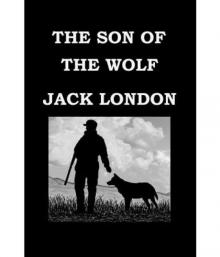 The Son of the Wolf
The Son of the Wolf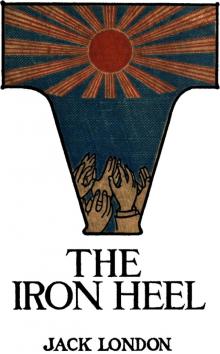 The Iron Heel
The Iron Heel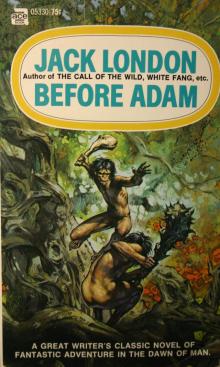 Before Adam
Before Adam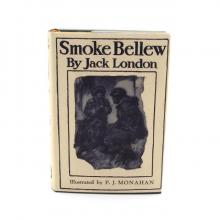 Smoke Bellew
Smoke Bellew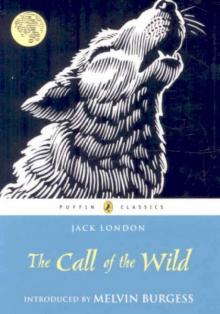 The Call of the Wild
The Call of the Wild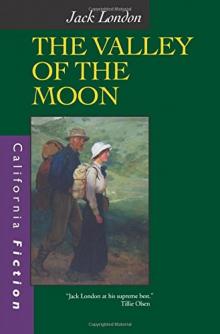 The Valley of the Moon Jack London
The Valley of the Moon Jack London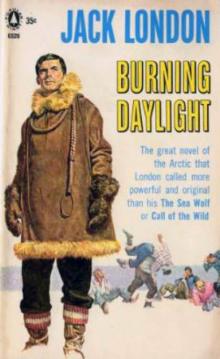 Burning Daylight
Burning Daylight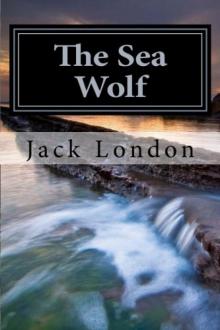 The Sea Wolf
The Sea Wolf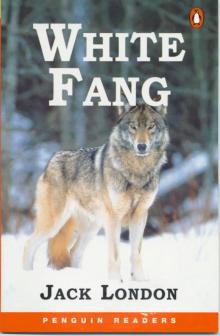 White Fang
White Fang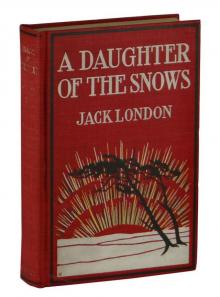 A Daughter of the Snows
A Daughter of the Snows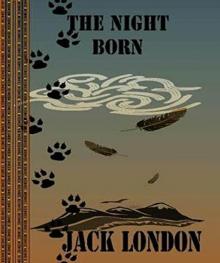 The Night-Born
The Night-Born A Son Of The Sun
A Son Of The Sun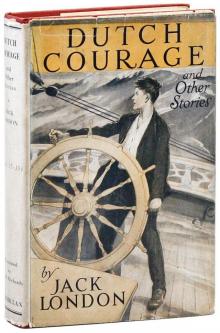 Dutch Courage and Other Stories
Dutch Courage and Other Stories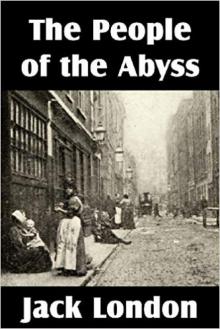 The People of the Abyss
The People of the Abyss Michael, Brother of Jerry
Michael, Brother of Jerry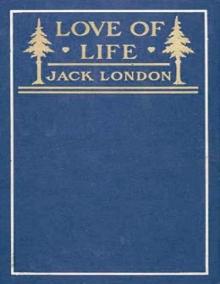 Love of Life, and Other Stories
Love of Life, and Other Stories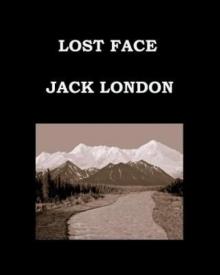 Lost Face
Lost Face The Road
The Road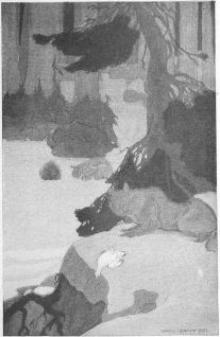 Love of Life
Love of Life The Turtles of Tasman
The Turtles of Tasman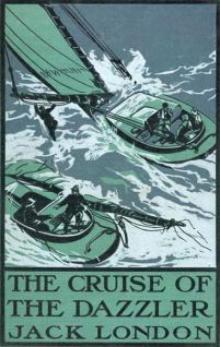 The Cruise of The Dazzler
The Cruise of The Dazzler The Heathen
The Heathen The Scab
The Scab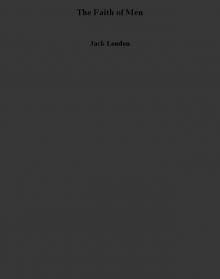 The Faith of Men
The Faith of Men Adventure
Adventure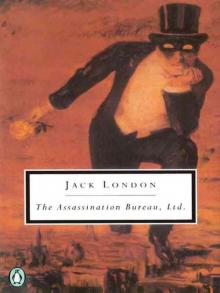 The Assassination Bureau, Ltd.
The Assassination Bureau, Ltd.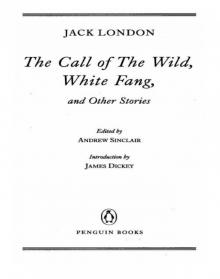 The Call of the Wild, White Fang, and Other Stories
The Call of the Wild, White Fang, and Other Stories The Call of the Wild and Selected Stories
The Call of the Wild and Selected Stories Jerry of the Islands
Jerry of the Islands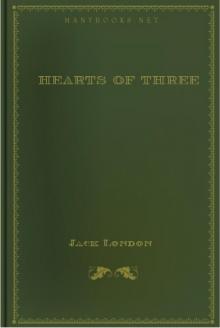 Hearts of Three
Hearts of Three The House of Pride
The House of Pride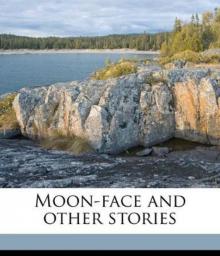 Moon-Face and Other Stories
Moon-Face and Other Stories Children of the Frost
Children of the Frost South Sea Tales
South Sea Tales The Strength of the Strong
The Strength of the Strong The Jacket (The Star-Rover)
The Jacket (The Star-Rover) The Little Lady of the Big House
The Little Lady of the Big House John Barleycorn
John Barleycorn ADaugter of Snows
ADaugter of Snows The Mutiny of the Elsinore
The Mutiny of the Elsinore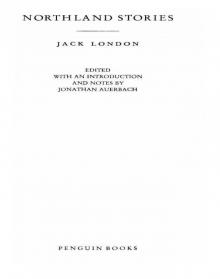 Northland Stories
Northland Stories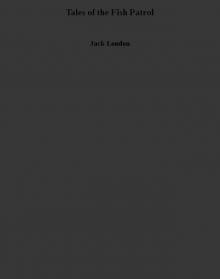 Tales of the Fish Patrol
Tales of the Fish Patrol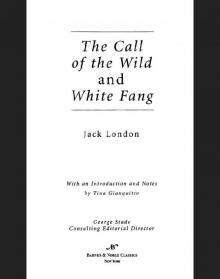 Call of the Wild and White Fang (Barnes & Noble Classics Series)
Call of the Wild and White Fang (Barnes & Noble Classics Series)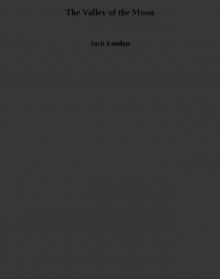 The Valley of the Moon
The Valley of the Moon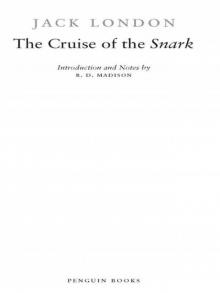 The Cruise of the Snark
The Cruise of the Snark The Game
The Game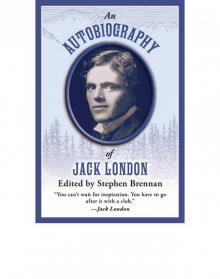 An Autobiography of Jack London
An Autobiography of Jack London